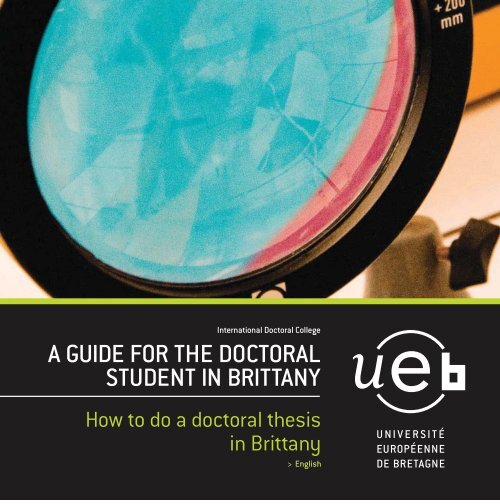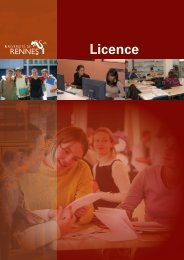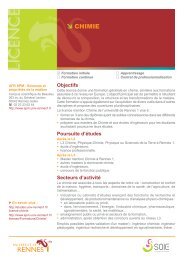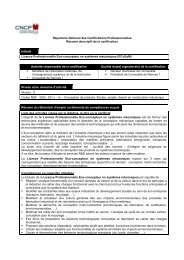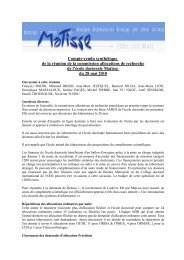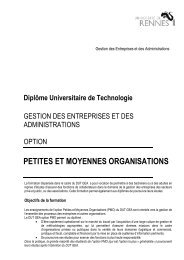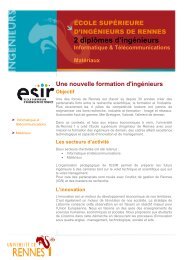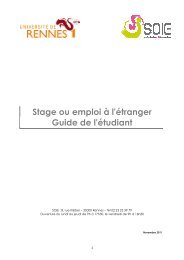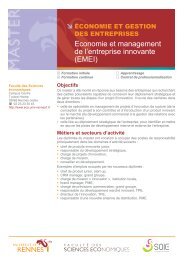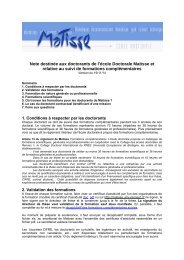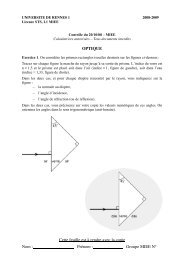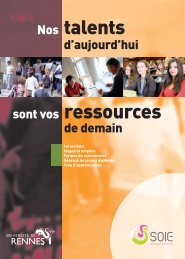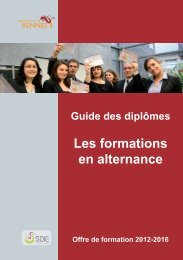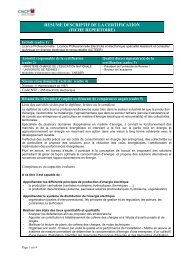a guide for the doctoral student in brittany - Université de Rennes 1
a guide for the doctoral student in brittany - Université de Rennes 1
a guide for the doctoral student in brittany - Université de Rennes 1
- No tags were found...
You also want an ePaper? Increase the reach of your titles
YUMPU automatically turns print PDFs into web optimized ePapers that Google loves.
International Doctoral CollegeA GUIDE FOR THE DOCTORALSTUDENT IN BRITTANYHow to do a <strong>doctoral</strong> <strong>the</strong>sis<strong>in</strong> Brittany> English
A GUIDE FOR THE DOCTORALSTUDENT IN BRITTANYHow to do a <strong>doctoral</strong><strong>the</strong>sis <strong>in</strong> Brittany1UNIVERSITÉ EUROPÉENNEDE BRETAGNE2DOCTORAL SCHOOLSIN BRITTANY3ADMITTANCETO A DOCTORAL SCHOOL4THESIS PROCEDURE5THESIS DEFENCE /ORAL EXAMINATION6INTERNATIONAL OPENNESS7AFTER THE THESIS8DOCUMENTATION,REPORTS, AND STUDIESp.32.1 SHOS p.62.2 ALL p.62.3 SHS p.72.4 MATISSE p.82.5 SICMA p.92.6 EDSM p.102.7 VAS p.102.8 SDLM p.112.9 International Doctoral College p.123.1 General presentation p.133.2 F<strong>in</strong>ancial support <strong>for</strong> <strong>doctoral</strong> <strong>stu<strong>de</strong>nt</strong>s p.143.3 Request <strong>for</strong> special dispensation<strong>for</strong> <strong>the</strong>sis registration p.164.1 General presentation p.174.2 Thesis charter p.194.3 Jo<strong>in</strong>t <strong>doctoral</strong> supervision p.204.4 Introduction to teach<strong>in</strong>g <strong>in</strong> higher education p.204.5 Doctoral <strong>stu<strong>de</strong>nt</strong>s as research assistants <strong>in</strong> bus<strong>in</strong>ess p.224.6 Social welfare p.234.7 Doctoral tra<strong>in</strong><strong>in</strong>g p.244.8 Duration of <strong>the</strong> <strong>the</strong>sis p.245.1 Thesis <strong>de</strong>fence authorisation& <strong>the</strong> board of exam<strong>in</strong>ers p.265.2 Cover of <strong>the</strong> <strong>the</strong>sis p.276.1 International Office contacts p.286.2 European Doctoral Stu<strong>de</strong>nt p.286.3 International ‘cotutelle’(jo<strong>in</strong>t research supervision) doctorates p.29p.30p.311UNIVERSITÉ EUROPÉENNEDE BRETAGNEThe UEB - guaranteed excellence and <strong>in</strong>ternational ambition.The UEB – <strong>Université</strong> Européenne <strong>de</strong> Bretagne (<strong>the</strong> European Universityof Brittany) – is one of <strong>the</strong> PRES (Pôles <strong>de</strong> Recherche et d’Enseignement Supérieur –research and higher education clusters) created by <strong>de</strong>cree <strong>in</strong> March 2007.With 72,000 <strong>stu<strong>de</strong>nt</strong>s and more than 6,000 professionalsat <strong>the</strong> service of higher education and research, <strong>the</strong> UEBenables establishments to acquire a critical size - a crucialcriterion <strong>for</strong> greater <strong>in</strong>ternational prom<strong>in</strong>ence and recognition.The UEB - toge<strong>the</strong>r with its 9 foun<strong>de</strong>r members (<strong>Université</strong> <strong>de</strong>Bretagne Occi<strong>de</strong>ntale, <strong>Université</strong> <strong>de</strong> Bretagne Sud, <strong>Université</strong> <strong>de</strong> <strong>Rennes</strong> 1,<strong>Université</strong> <strong>Rennes</strong> 2, Agrocampus Ouest, ENS Cachan (Brittany campus), ENSCR,INSA <strong>Rennes</strong>, and TELECOM Bretagne)and its 14 associate members (Centre Régional <strong>de</strong> Lutte Contre le Cancer(Centre Eugène Marquis), <strong>the</strong> Brest and <strong>Rennes</strong> university teach<strong>in</strong>g hospitals,Écoles <strong>de</strong> Sa<strong>in</strong>t-Cyr Coëtquidan, EHESP, École Navale, Enib, Ensai, IEP <strong>de</strong> <strong>Rennes</strong>,Ensieta, Supélec (<strong>Rennes</strong> campus), <strong>the</strong> Roscoff Station Biologique (<strong>Université</strong>Paris 6), Cemagref, and INRIA <strong>Rennes</strong> - Bretagne Atlantique - is comb<strong>in</strong><strong>in</strong>gits strengths and tak<strong>in</strong>g up its place as a research and highereducation cluster of <strong>in</strong>ternational stature.The <strong>Université</strong> Européenne <strong>de</strong> Bretagne is an ‘établissement public <strong>de</strong> coopérationscientifique’ (EPCS – public scientific cooperation <strong>in</strong>stitution) whose headquartersare <strong>in</strong> <strong>Rennes</strong>. It is hea<strong>de</strong>d by its presi<strong>de</strong>nt, Bertrand Fort<strong>in</strong>, and managedby a govern<strong>in</strong>g council.See <strong>the</strong> UEB’s website:>> www.ueb.eu3
2DOCTORAL SCHOOLS IN BRITTANYBrittany has about 2,800 <strong>doctoral</strong> <strong>stu<strong>de</strong>nt</strong>s who are divi<strong>de</strong>dup <strong>in</strong>to 8 <strong>doctoral</strong> schools. The <strong>doctoral</strong> schools, which actas research team support structures, promote synergybetween <strong>the</strong> discipl<strong>in</strong>es and offer supplementary coursesto facilitate career <strong>de</strong>velopment.The 8 <strong>doctoral</strong> schools are structured around Brittany’s 4 universities(<strong>the</strong> <strong>Université</strong> <strong>de</strong> Bretagne Occi<strong>de</strong>ntale (UBO), <strong>the</strong> <strong>Université</strong> <strong>de</strong> Bretagne-Sud(UBS), <strong>the</strong> <strong>Université</strong> <strong>de</strong> <strong>Rennes</strong> 1, and <strong>the</strong> <strong>Université</strong> <strong>Rennes</strong> 2 – HauteBretagne).The UEB represents an enormous research potential, and thusit has responsibilities which are just as important as thosewhich are teach<strong>in</strong>g and tra<strong>in</strong><strong>in</strong>g-related.This tra<strong>in</strong><strong>in</strong>g and experience <strong>in</strong> research are an essential requisite <strong>for</strong> <strong>the</strong> <strong>de</strong>velopmentof a knowledge and <strong>in</strong>novation-based economy and society - a recognisedobjective of <strong>the</strong> European Union.It is <strong>the</strong> UEB’s ambition to contribute to this by offer<strong>in</strong>g with<strong>in</strong> its <strong>doctoral</strong>programmes a very high level of scientific <strong>doctoral</strong> tra<strong>in</strong><strong>in</strong>g, a diverse rangeof supplementary courses, and personalised supervision of <strong>doctoral</strong> <strong>stu<strong>de</strong>nt</strong>s’professional projects. To guarantee <strong>the</strong> quality of its doctorate and to fulfil<strong>the</strong> ambitions of its <strong>doctoral</strong> policy, <strong>the</strong> UEB attaches great importance to severalkey po<strong>in</strong>ts:Transparency:In <strong>the</strong> recruitment of <strong>doctoral</strong> <strong>stu<strong>de</strong>nt</strong>s and <strong>the</strong> award<strong>in</strong>g of research grants,and <strong>in</strong> <strong>the</strong> respect of <strong>the</strong> rights and duties of <strong>doctoral</strong> <strong>stu<strong>de</strong>nt</strong>s, tra<strong>in</strong>ersand supervisors, <strong>the</strong> laboratory, or <strong>the</strong> host establishment - as expressed <strong>in</strong><strong>the</strong> Doctorate Charter;Welcome:A personalised welcome makes it easier to <strong>de</strong>al on an <strong>in</strong>dividual basis with alldoctorate-related adm<strong>in</strong>istrative questions;The professional project:An <strong>in</strong>dividual cont<strong>in</strong>u<strong>in</strong>g tra<strong>in</strong><strong>in</strong>g plan <strong>in</strong> addition to <strong>the</strong> research project. Thispromotes <strong>the</strong> <strong>de</strong>velopment, <strong>de</strong>epen<strong>in</strong>g, and diversification of knowledgeand skills well beyond that of <strong>the</strong> scientific threshold;Increase of <strong>the</strong> awareness of supervisors and tra<strong>in</strong>ers:by consciousness-rais<strong>in</strong>g sem<strong>in</strong>ars on <strong>doctoral</strong> <strong>stu<strong>de</strong>nt</strong>s’ professional projects;The future of <strong>doctoral</strong> <strong>stu<strong>de</strong>nt</strong>s:by <strong>the</strong> monitor<strong>in</strong>g of <strong>doctoral</strong> tra<strong>in</strong><strong>in</strong>g <strong>in</strong>dicators, and help <strong>in</strong> job search preparationand career <strong>de</strong>velopment;Network<strong>in</strong>gof <strong>the</strong> UEB’s <strong>doctoral</strong> <strong>stu<strong>de</strong>nt</strong>s and doctors through a variety of associations.4See <strong>the</strong> m<strong>in</strong>isterial or<strong>de</strong>r of 7 August 2006on <strong>doctoral</strong> tra<strong>in</strong><strong>in</strong>g:>> www.legifrance.gouv.fr5
2.1 SHOSSciences of Man, Organisations, and Society Doctoral School / Sciences <strong>de</strong> l’Homme, <strong>de</strong>s Organisations et <strong>de</strong> la Société2.3 SHSHumanities and Social Sciences Doctoral School / Sciences Huma<strong>in</strong>es et SocialesThe SHOS (Sciences <strong>de</strong> l’Homme, <strong>de</strong>s Organisations et <strong>de</strong> la Société – Sciences of Man, Organisations, and Society)Doctoral School covers <strong>the</strong> follow<strong>in</strong>g subject fields:> law > economics > management > political science > and philosophy.This Doctoral School is <strong>the</strong> subject of jo<strong>in</strong>t accreditation between 4 establishments:> <strong>the</strong> <strong>Université</strong> <strong>de</strong> <strong>Rennes</strong> 1 (key establishment),> <strong>the</strong> <strong>Université</strong> <strong>de</strong> Bretagne-Sud,> <strong>the</strong> <strong>Université</strong> <strong>de</strong> Bretagne Occi<strong>de</strong>ntale,> and Agrocampus Ouest.It is associated with <strong>the</strong> Institut d’Étu<strong>de</strong>s Politiques (IEP) <strong>de</strong> <strong>Rennes</strong>, <strong>the</strong> École <strong>de</strong>s Hautes Etu<strong>de</strong>sen Santé Publique (EHESP – school of public health), and <strong>the</strong> ENS Cachan (Brittany campus)(specialist advanced courses <strong>for</strong> teachers, researchers, and university lecturers).>> Director, SHOS Doctoral School: Prof. Sylvie HENNION / E-mail: sylvie.hennion@univ-rennes1.fr>> École Doctorale SHOS - 9 rue Jean Macé - CS 54203 - 35042 RENNES Ce<strong>de</strong>xTel: 33 (0)2 23 23 37 53 / Fax: 33 (0)2 23 23 76 55 / E-mail: edocshos@univ-rennes1.fr2.2 ALLArts, Literature, and Languages Doctoral School / Arts, Lettres et LanguesThe SHS Doctoral School covers <strong>the</strong> follow<strong>in</strong>g subject fields:> psychology and sociology > geography > spatial plann<strong>in</strong>g and remote sens<strong>in</strong>g ><strong>in</strong><strong>for</strong>mation and communication > archaeology and ancient, mo<strong>de</strong>rn, and contemporary historyWith<strong>in</strong> <strong>the</strong> framework of <strong>the</strong> 2008-2011 four-year contract, this new <strong>doctoral</strong> school is <strong>the</strong> subjectof jo<strong>in</strong>t accreditation between 3 establishments:> <strong>the</strong> <strong>Université</strong> <strong>Rennes</strong> 2 (key establishment)> <strong>the</strong> <strong>Université</strong> <strong>de</strong> Bretagne-Sud> <strong>the</strong> <strong>Université</strong> <strong>de</strong> Bretagne Occi<strong>de</strong>ntaleThe <strong>doctoral</strong> schools’ ma<strong>in</strong> educational thrust is <strong>the</strong>ir focus on <strong>the</strong> professional <strong>in</strong>tegration of <strong>doctoral</strong> <strong>stu<strong>de</strong>nt</strong>s,with <strong>the</strong>m start<strong>in</strong>g as junior researchers <strong>in</strong> research units, where <strong>the</strong> best possible research conditions shouldbe provi<strong>de</strong>d <strong>for</strong> <strong>the</strong>m with<strong>in</strong> a context of group dynamics.>> Director, SHS Doctoral School: Prof.V<strong>in</strong>cent DUBREUIL / E-mail: v<strong>in</strong>cent.dubreuil@uhb.frCo-director, UBO: Prof. Arlette Gautier / E-mail:arlette.gautier@univ-brest.frCo-director, UBS: Prof. Gérard Le Boué<strong>de</strong>c/ E-mail:gerard.le-boue<strong>de</strong>c@univ-ubs.fr>> École Doctorales ALL et SHS - <strong>Université</strong> <strong>Rennes</strong> 2Campus <strong>de</strong> Villejean – Place Recteur Henri Le Moal – CS24307 – 35043 RENNESTel. 33 (0)2 99 14 11 32 / Fax: 33 (0)2 99 14 11 35The ALL Doctoral School covers <strong>the</strong> follow<strong>in</strong>g subject fields:> plastic arts and <strong>the</strong> history of art > languages and civilisations > <strong>the</strong> French-speak<strong>in</strong>g world > l<strong>in</strong>guistics >literary studies > and educational sciences.With<strong>in</strong> <strong>the</strong> framework of <strong>the</strong> 2008-2011 four-year contract, this new <strong>doctoral</strong> school is <strong>the</strong> subject of jo<strong>in</strong>taccreditation between 3 establishments:> <strong>the</strong> <strong>Université</strong> <strong>Rennes</strong> 2 (key establishment)> <strong>the</strong> <strong>Université</strong> <strong>de</strong> Bretagne-Sud> <strong>the</strong> <strong>Université</strong> <strong>de</strong> Bretagne Occi<strong>de</strong>ntaleThe <strong>doctoral</strong> schools’ ma<strong>in</strong> educational thrust is <strong>the</strong>ir focus on <strong>the</strong> professional <strong>in</strong>tegration of <strong>doctoral</strong> <strong>stu<strong>de</strong>nt</strong>s,with <strong>the</strong>m start<strong>in</strong>g as junior researchers <strong>in</strong> research units, where <strong>the</strong> best possible research conditions shouldbe provi<strong>de</strong>d <strong>for</strong> <strong>the</strong>m with<strong>in</strong> a context of group dynamics.>> Director, ALL Doctoral School: Prof. Jean-Marc POINSOT / E-mail: jean-marc.po<strong>in</strong>sot@univ-rennes2.frCo-director, UBO: Prof. Florence Vuilleumier-Laurens / E-mail: florence.vuilleumier@univ-brest.frCo-director, UBS: Prof. Rémi Le Marc’hadour / E-mail: remi.le-marchadour@univ-ubs.fr>> Écoles Doctorales ALL et SHS - <strong>Université</strong> <strong>Rennes</strong> 2Campus <strong>de</strong> Villejean – Place Recteur Henri Le Moal – CS24307 – 35043 RENNESTel. 33 (0)2 99 14 11 32 / Fax: 33 (0)2 99 14 11 3567
2.4 MATISSEMa<strong>the</strong>matics, Telecommunications, Computer Science, Signal, Systems, and Electronics Doctoral School /Mathématiques, Télécommunications, In<strong>for</strong>matique, Signal, Systèmes, Electronique2.5 SICMAHealth, In<strong>for</strong>mation, Communications, Ma<strong>the</strong>matics and Materials Doctoral School /Santé, In<strong>for</strong>mation - Communications, Mathématiques, MatièreThe Matisse Doctoral School covers <strong>the</strong> follow<strong>in</strong>g subject fields:ma<strong>the</strong>matics and its <strong>in</strong>teractions > telecommunications > computer science > signal process<strong>in</strong>g, systems > electronics.Il is <strong>the</strong> subject of a jo<strong>in</strong>t accreditation between 7 establishments:> <strong>the</strong> <strong>Université</strong> <strong>de</strong> <strong>Rennes</strong> 1,> <strong>the</strong> <strong>Université</strong> <strong>Rennes</strong> 2,> TELECOM Bretagne,> INSA <strong>de</strong> <strong>Rennes</strong>,> Agrocampus Ouest,> ENS Cachan (Brittany campus),> and Supélec (<strong>Rennes</strong> campus).The Matisse Doctorale School is constructed on <strong>the</strong> base of 8 research laboratories with<strong>in</strong> <strong>the</strong> fields of <strong>in</strong><strong>for</strong>mationand communication science and technology and ma<strong>the</strong>matics:> Institut d'Électronique et <strong>de</strong> Télécommunications <strong>de</strong> <strong>Rennes</strong> (IETR - CNRS)> Institut <strong>de</strong> Recherche en In<strong>for</strong>matique et Systèmes Aléatoires (IRISA - INRIA)> Centre Inria <strong>Rennes</strong> - Bretagne Atlantique (INRIA <strong>Rennes</strong>)> Institut <strong>de</strong> Recherche Mathématique <strong>de</strong> <strong>Rennes</strong> (IRMAR - CNRS)> Laboratoire d'Analyse <strong>de</strong>s Systèmes <strong>de</strong> Traitement <strong>de</strong> l'In<strong>for</strong>mation (LTSI - INSERM)> Équipe Sécurité <strong>de</strong>s Systèmes d'In<strong>for</strong>mation et Réseaux (SSIR)> Équipes <strong>de</strong> recherche <strong>de</strong> Telecom Bretagne> Équipe Traitement <strong>de</strong>s Signaux et Images Multicomposantes et Multimodales (TSI2M)>> Director: Prof. Olivier BONNAUD / E-mail: olivier.bonnaud@univ-rennes1.frÉcole Doctorale MATISSE - <strong>Université</strong> <strong>de</strong> <strong>Rennes</strong> 1 - Avenue du Général Leclerc - Bâtiment 11D>> Campus <strong>de</strong> Beaulieu - 35042 <strong>Rennes</strong> Ce<strong>de</strong>xTel. 33 (0)2 23 23 59 19 / Fax: 33 (0)2 23 23 56 57 / E-mail: edm@univ-rennes1.frWebsite: www.matisse.univ-rennes1.frSICMA is a new fe<strong>de</strong>rative-type <strong>doctoral</strong> school whose ambition is to br<strong>in</strong>g toge<strong>the</strong>r and structure tra<strong>in</strong><strong>in</strong>g-by-researchactivities along Brittany’s Atlantic coast.The SICMA (Santé, In<strong>for</strong>mation – Communications, Mathématiques, Matière – health, <strong>in</strong><strong>for</strong>mation – communications,ma<strong>the</strong>matics, materials) Doctoral School is <strong>the</strong> subject of jo<strong>in</strong>t accreditation between 3 establishments:> <strong>the</strong> <strong>Université</strong> <strong>de</strong> Bretagne Occi<strong>de</strong>ntale (UBO – <strong>the</strong> key establishment),> <strong>the</strong> <strong>Université</strong> <strong>de</strong> Bretagne-Sud (UBS),> and TELECOM Bretagne.It is associated with 5 eng<strong>in</strong>eer<strong>in</strong>g schools:> <strong>the</strong> École Nationale d’Ingénieurs <strong>de</strong> Brest (ENIB),> <strong>the</strong> École Nationale Supérieure <strong>de</strong>s Étu<strong>de</strong>s et Techniques d’Armement (ENSIETA),> <strong>the</strong> École Navale,> <strong>the</strong> Institut Supérieur <strong>de</strong> l’Electronique et du Numérique (ISEN-Brest),> and <strong>the</strong> École Spéciale Militaire <strong>de</strong> Sa<strong>in</strong>t Cyr.The <strong>doctoral</strong> school is structured <strong>in</strong>to three discipl<strong>in</strong>ary group<strong>in</strong>gs:> Maths-STIC: Ma<strong>the</strong>matics, electronics, telecommunications, ultra high frequency and opticalcommunication systems, computer science, signal and image process<strong>in</strong>g, and virtual reality.> Materials: Molecular chemistry, analytical chemistry, physics of materials and applications,mechanics of structures, mechanical and electrical eng<strong>in</strong>eer<strong>in</strong>g, and rheology.> Biology - Health: Microbiology, comparative and <strong>in</strong>tegrative physiology, food toxicology, biodiversityand microbial ecology, molecular genetics, immunology, thrombosis, oxylipid metabolism,and medical imag<strong>in</strong>g.>> Director: Prof. Christian BROSSEAU / E-mail: christian.brosseau@univ-brest.fr>> École Doctorale SICMA, 6 avenue Victor Le Gorgeu - CS93837 - 29238 Brest Ce<strong>de</strong>x 3Tel. 33 (0)2 98 01 70 32 / Fax: 33 (0)2 98 01 61 31 / E-mail: dsicma@univ-brest.frWebsite: http://edsicma.univ-brest.fr89
2.6 EDSMMar<strong>in</strong>e Sciences Doctoral School / Ecole Doctorale Sciences <strong>de</strong> la Mer2.8 SCIENCES DE LA MATIEREMaterials Science Doctoral School / Sciences <strong>de</strong> la MatièreThe purpose of <strong>the</strong> Doctoral School (EDSM – mar<strong>in</strong>e sciences)is to tra<strong>in</strong> specialists <strong>in</strong> <strong>the</strong> follow<strong>in</strong>g 8 subject fields:> mar<strong>in</strong>e biological science > microbiology of extreme environments > chemistry of <strong>the</strong> mar<strong>in</strong>e environment >oceanic geosciences > oceanic and atmospheric physics > geography > law, and economics.The Sciences <strong>de</strong> la Mer Doctoral School is supported by a network of about thirty <strong>de</strong>partments, laboratories,and host teams <strong>in</strong> France, and this represents a supervisory potential of more than 130 researcherswho are authorised to supervise research. As a member of <strong>the</strong> MENTOR network, <strong>the</strong> École DoctoraleEuropéenne <strong>de</strong>s Sciences <strong>de</strong> la Mer consi<strong>de</strong>rably expands <strong>the</strong> scope <strong>for</strong> collaboration between <strong>the</strong> <strong>doctoral</strong><strong>stu<strong>de</strong>nt</strong>s’ host laboratories.>> Director: Prof. Christophe HEMOND / E-mail: chhemond@univ-brest.fr>> École Doctorale <strong>de</strong>s Sciences <strong>de</strong> la Mer – Institut Universitaire Européen <strong>de</strong> la MerPlace Nicolas Copernic – Technopôle Brest-Iroise – 29280 PLOUZANETel. 33 (0)2 98 49 86 00 / Fax: 33 (0)2 98 49 86 09Website: www.univ-brest.fr/IUEM/enseignement/ecole-<strong>doctoral</strong>e2.7 VASDoctoral School life-agro-health / Vie-Agro-SantéThe <strong>Rennes</strong> SDLM Doctoral School covers <strong>the</strong> follow<strong>in</strong>g subject fields:> physics > chemistry > earth sciences > archaeology > mechanics >and environmental telecommunications and eng<strong>in</strong>eer<strong>in</strong>g.This Doctoral School is <strong>the</strong> subject of jo<strong>in</strong>t accreditation between 5 establishments:> <strong>the</strong> <strong>Université</strong> <strong>de</strong> <strong>Rennes</strong> 1 (key establishment),> <strong>the</strong> <strong>Université</strong> <strong>Rennes</strong> 2,> INSA <strong>de</strong> <strong>Rennes</strong>,> ENSCR (school of chemistery),> Agrocampus Ouest ,> and is associated with Cemagref as a host<strong>in</strong>g team.>> Director: DR Olivier DAUTEUIL / E-mail: sdlm@univ-rennes1.fr>> École Doctorale SDLM - Campus <strong>de</strong> Beaulieu - Bâtiment 1 - 35042 RENNES Ce<strong>de</strong>xTel. 33 (0)2 23 23 52 39 / Fax: 33 (0)2 23 23 61 00 / E-mail: sdlm@univ-rennes1.frWebsite: http://sdlm.univ-rennes1.frThe VAS Doctoral School covers <strong>the</strong> follow<strong>in</strong>g subject areas:> biology > health > and agronomy.This Doctoral School is <strong>the</strong> subject of jo<strong>in</strong>t accreditation between 3 establishments:> <strong>the</strong> <strong>Université</strong> <strong>de</strong> <strong>Rennes</strong> 1 (key establishment),> <strong>the</strong> <strong>Université</strong> <strong>Rennes</strong> 2,> Agrocampus Ouest,> and is associated with both INRA (national agronomic research <strong>in</strong>stiute), and <strong>the</strong> Cemagref(land and water management research <strong>in</strong>stitute).In addition, <strong>the</strong>se research units or teams are l<strong>in</strong>ked to such research organisations as CNRS, INRA,INSERM, AFSSA, IRD, IFREMER, and <strong>the</strong> École <strong>de</strong>s Hautes Étu<strong>de</strong>s en Santé Publique (EHESP).The VAS Doctoral School is l<strong>in</strong>ked to <strong>the</strong> <strong>doctoral</strong> school network <strong>in</strong>volved <strong>in</strong> biomedical research,and is play<strong>in</strong>g an active part <strong>in</strong> <strong>the</strong> establishment of a <strong>doctoral</strong> school network with<strong>in</strong> <strong>the</strong> frameworkof West France’s Pôle Agronomique (agronomic research cluster).>> Director: Prof. Yvan LAGADEUC – Tel.: 01 23 23 63 76 / E-mail: yvan.laga<strong>de</strong>uc@univ-rennes1.fr>> École Doctorale VAS - Campus <strong>de</strong> Beaulieu - Bâtiment 13 - 35042 RENNES Ce<strong>de</strong>xTel. 33 (0)2 23 23 51 19 / Fax: 33 (0)2 23 23 51 28 / E-mail: vas@univ-rennes1.frWebsite: www.vas.univ-rennes1.fr1011
3ADMITTANCETO A DOCTORAL SCHOOL3.1 General presentationApplication to a <strong>doctoral</strong> school is a matter <strong>for</strong> a team ma<strong>de</strong> up of <strong>the</strong> <strong>doctoral</strong><strong>stu<strong>de</strong>nt</strong>, <strong>the</strong> <strong>the</strong>sis director, and <strong>the</strong> laboratory. The first stage of <strong>the</strong> applicationprocedure is <strong>the</strong>re<strong>for</strong>e to make contact with <strong>the</strong> laboratory that best correspondsto your field of <strong>in</strong>terest. Alternatively, you can contact <strong>the</strong> director of <strong>the</strong> <strong>doctoral</strong>school, who will direct you to a laboratory.A doctorate is based on an orig<strong>in</strong>al and <strong>for</strong>mative researchproject, which must enable <strong>the</strong> candidate to become an<strong>in</strong>ternational expert <strong>in</strong> his scientific field with<strong>in</strong> 3 years, andto acquire a variety of skills, not only technical and organisationalbut also <strong>in</strong>terpersonal.2.9 International Doctoral CollegeThe International Doctoral College (IDC)’s mission is to br<strong>in</strong>g toge<strong>the</strong>r andcoord<strong>in</strong>ate <strong>the</strong> <strong>in</strong>ternational activities of <strong>doctoral</strong> tra<strong>in</strong><strong>in</strong>g <strong>in</strong> Brittany <strong>in</strong> or<strong>de</strong>rto raise and streng<strong>the</strong>n its <strong>in</strong>ternational profile and enhance <strong>the</strong> attractivenessof <strong>the</strong> region’s universities and “gran<strong>de</strong>s écoles” (competitive-entrance highereducation establishments award<strong>in</strong>g highly-respected <strong>de</strong>grees). It is committedto promot<strong>in</strong>g <strong>in</strong>ternational openness, and so to encourag<strong>in</strong>g future researchersto ga<strong>in</strong> <strong>the</strong> wi<strong>de</strong>st possible perspective by profit<strong>in</strong>g to <strong>the</strong> full from <strong>the</strong> reward<strong>in</strong>gprospects of scientific research and <strong>in</strong>ternational mission-based support andtop-quality exchanges.The IDC also coord<strong>in</strong>ates certa<strong>in</strong> <strong>doctoral</strong> school activities, such as <strong>the</strong> standardisationof practices and procedures, <strong>in</strong>clud<strong>in</strong>g <strong>the</strong> <strong>de</strong>posit of digital copiesof <strong>the</strong>ses, and <strong>the</strong> signature of doctorates awar<strong>de</strong>d un<strong>de</strong>r <strong>the</strong> seal of <strong>the</strong><strong>Université</strong> Européenne <strong>de</strong> Bretagne by accredited establishments. It supports<strong>the</strong> Doctoriales®Bretagne (annual week-long sem<strong>in</strong>ars aimed at prepar<strong>in</strong>g <strong>doctoral</strong><strong>stu<strong>de</strong>nt</strong>s <strong>for</strong> post-<strong>doctoral</strong> life), professionalisation policies and relations with<strong>the</strong> world of work, and <strong>the</strong> monitor<strong>in</strong>g, toge<strong>the</strong>r with <strong>the</strong> UEB’s research centre,of <strong>the</strong> professional <strong>in</strong>tegration of doctors.The International Doctoral College acts as a means agency, <strong>de</strong>al<strong>in</strong>g with calls<strong>for</strong> ten<strong>de</strong>r <strong>for</strong> projects whose aim is tra<strong>in</strong><strong>in</strong>g support and <strong>the</strong> enhancementof <strong>the</strong> <strong>in</strong>ternational reputation <strong>for</strong> excellence of its doctors and <strong>the</strong>ir <strong>in</strong>ternationalmobility.It is <strong>de</strong>velop<strong>in</strong>g around <strong>the</strong> skills hubs of Brittany’s universities and “gran<strong>de</strong>sécoles”. International, regional, and <strong>in</strong>ter-regional actors such as <strong>the</strong> competitiveclusters, <strong>the</strong> Maisons <strong>de</strong>s Sciences <strong>de</strong> l’Homme (MSHB – science of mancentres), or research networks such as <strong>the</strong> Groupements <strong>de</strong> Recherche (GDR –research group<strong>in</strong>gs), and Groupements d’Intérêt Scientifique (GIS – scientific<strong>in</strong>terest group<strong>in</strong>gs), also constitute a potential upon which <strong>the</strong> UEB and <strong>the</strong>International Doctoral College can <strong>de</strong>pend <strong>in</strong> <strong>the</strong> <strong>in</strong>itiation and <strong>de</strong>velopmentof cross-sectoral projects.12For fur<strong>the</strong>r <strong>in</strong><strong>for</strong>mation:Tel. :+33 (0)2 97 01 71 34> secretariat-cdi@ueb.eu>> www.ueb.eu/<strong>the</strong>mes/collegeDoctoralInternational/.Doctoral admission procedures1. Preparation of <strong>doctoral</strong> research projects>> Actor:Research laboratories are responsible <strong>for</strong> <strong>the</strong> <strong>for</strong>mulationof <strong>doctoral</strong> research projects because of <strong>the</strong>ir knowledgeof <strong>the</strong> state of <strong>the</strong> art relat<strong>in</strong>g to <strong>the</strong>ir scientific discipl<strong>in</strong>es.Each <strong>doctoral</strong> project is supervised by a <strong>the</strong>sis director.>> Content:A <strong>doctoral</strong> project is ma<strong>de</strong> up of a research subject, andtechnical, human, and f<strong>in</strong>ancial means – <strong>in</strong>clud<strong>in</strong>g pay <strong>for</strong><strong>the</strong> <strong>doctoral</strong> <strong>stu<strong>de</strong>nt</strong> – which are comb<strong>in</strong>ed to ensure thatall goes well and that <strong>the</strong> applicant has <strong>the</strong> required profile.>> Diffusion:In<strong>for</strong>mation on <strong>doctoral</strong> projects is wi<strong>de</strong>ly published andcirculated by laboratories and <strong>doctoral</strong> schools to encourage<strong>the</strong> greatest number of applicants.2. Applications>> Actor:Applicants <strong>for</strong> admission get to know about <strong>doctoral</strong>project offers, reply to <strong>the</strong>m, and contact those <strong>in</strong> chargeof <strong>the</strong> projects.>> Content:Applicants must provi<strong>de</strong> <strong>the</strong> documents required <strong>for</strong><strong>the</strong>ir application (CV, cover<strong>in</strong>g letter, and any o<strong>the</strong>rdocument(s) requested <strong>in</strong> <strong>the</strong> offer).3. Admissions <strong>in</strong>terview:The admissions process <strong>in</strong>clu<strong>de</strong>s one or more <strong>in</strong>terviews,firstly with <strong>the</strong> <strong>the</strong>sis director. Then, <strong>de</strong>pend<strong>in</strong>g on <strong>the</strong> typeof fund<strong>in</strong>g <strong>the</strong> project will receive, <strong>the</strong> applicants may haveto have ano<strong>the</strong>r <strong>in</strong>terview or oral exam<strong>in</strong>ation <strong>in</strong> front of an<strong>in</strong>terview panel from <strong>the</strong> <strong>doctoral</strong> school to which <strong>the</strong> laboratoryis attached.4. Sign<strong>in</strong>g of <strong>the</strong> employment contract:Once <strong>the</strong> application has been accepted by <strong>the</strong> <strong>the</strong>sis directorand <strong>the</strong> <strong>doctoral</strong> school (and if o<strong>the</strong>r partners are <strong>in</strong>volved,e.g. a company <strong>in</strong> <strong>the</strong> case of a CIFRE agreement or non-French laboratories <strong>in</strong> <strong>the</strong> case of a jo<strong>in</strong>tly supervised‘cotutelle’ doctorate), <strong>the</strong> <strong>doctoral</strong> <strong>stu<strong>de</strong>nt</strong> signs an employmentcontract.5. Sign<strong>in</strong>g of <strong>the</strong> doctorate charter:F<strong>in</strong>ally, <strong>the</strong> <strong>stu<strong>de</strong>nt</strong> signs <strong>the</strong> Doctorate Charter, along withall <strong>the</strong> o<strong>the</strong>r actors <strong>in</strong>volved. The Doctorate Charter gives<strong>de</strong>tails of <strong>the</strong> rights and duties of each participant, andalthough <strong>the</strong> sign<strong>in</strong>g of <strong>the</strong> charter has no legal contractualvalue, its symbolic value is that it <strong>in</strong>dicates <strong>the</strong> end of <strong>the</strong>admissions procedure.6. Aca<strong>de</strong>mic registration:Once admitted, <strong>the</strong> <strong>doctoral</strong> <strong>stu<strong>de</strong>nt</strong> proceeds to <strong>the</strong>ir universityregistration.13
3.2 F<strong>in</strong>ancial support <strong>for</strong> <strong>doctoral</strong> <strong>stu<strong>de</strong>nt</strong>sThe central daily activity of <strong>doctoral</strong> <strong>stu<strong>de</strong>nt</strong>s is thatof research work on a project which is an <strong>in</strong>tegral part of<strong>the</strong> policy and pr<strong>in</strong>cipal scientific activity areas of which<strong>the</strong>y are members. This work consists of <strong>de</strong>vis<strong>in</strong>g and/ortest<strong>in</strong>g out new areas of knowledge and new methodologiesand expertise. Doctoral <strong>stu<strong>de</strong>nt</strong>s <strong>the</strong>re<strong>for</strong>e participate <strong>in</strong><strong>the</strong> scientific production of <strong>the</strong>ir laboratories, publish articles<strong>in</strong> national and <strong>in</strong>ternational scientific journals, and present<strong>the</strong>ir work at scientific conferences. It is <strong>the</strong> responsibilityof <strong>the</strong> organisations who recruit <strong>the</strong> <strong>doctoral</strong> <strong>stu<strong>de</strong>nt</strong>sto f<strong>in</strong>d out about or to make provision <strong>for</strong> <strong>the</strong> paymentof <strong>the</strong>ir future colleagues when <strong>the</strong>y are prepar<strong>in</strong>g a <strong>doctoral</strong>research project.The payment of <strong>doctoral</strong> <strong>stu<strong>de</strong>nt</strong>s is not only arecognition of <strong>the</strong>ir contribution to <strong>the</strong> laboratories’research ef<strong>for</strong>ts, but also a guaranteethat work will be carried out <strong>in</strong> professionalconditions of a high standard.Overview of <strong>the</strong> ma<strong>in</strong> types of fund<strong>in</strong>gFrench M<strong>in</strong>istry of Research grantA research grant is a salary paid by <strong>the</strong> French M<strong>in</strong>istryof Research with<strong>in</strong> <strong>the</strong> framework of a fixed-term employmentcontract (3 years <strong>for</strong> contracts set up from 2001)so as to enable <strong>the</strong> <strong>doctoral</strong> <strong>stu<strong>de</strong>nt</strong> to completely and entirely<strong>de</strong>vote <strong>the</strong>mself to <strong>the</strong>ir <strong>the</strong>sis preparation-relatedresearch work. Applications <strong>for</strong> such grants are generallyma<strong>de</strong> <strong>in</strong> April/May, with <strong>the</strong> Conseil <strong>de</strong> l’École Doctoralemeet<strong>in</strong>g dur<strong>in</strong>g <strong>the</strong> last two weeks of June to exam<strong>in</strong>e applicationsand award grants.>>http://dr.education.fr/Alloc_doc/alloc_1.htmlThe gross monthly salary <strong>in</strong> 10/2008 was about 1,660 euro.CIFREConvention Industrielle <strong>de</strong> Formation par la Recherche(<strong>in</strong>dustrial research by tra<strong>in</strong><strong>in</strong>g agreement):>> www.anrt.asso.frBDI CNRSFund<strong>in</strong>g <strong>for</strong> <strong>doctoral</strong> <strong>stu<strong>de</strong>nt</strong>s <strong>in</strong> eng<strong>in</strong>eer<strong>in</strong>g>> www.sg.cnrs.frAllocations <strong>de</strong> Recherche Doctorales(ARED) <strong>de</strong> la Région (regional <strong>doctoral</strong>research grants)Consult <strong>the</strong> ‘Région Bretagne’ website and watch out <strong>for</strong><strong>in</strong><strong>for</strong>mation that is regularly published by <strong>the</strong> Service <strong>de</strong> laRecherche. Applications <strong>for</strong> such grants can be ma<strong>de</strong> fromlate November, and must be received by early March>> http://xnet1.region-bretagne.fr/RechercheFund<strong>in</strong>g from charitablefoundations and organisationsDoctoral contract:Decree no. 2009-464 of 23 April 2009Valérie Pécresse, <strong>the</strong> French Higher Education andResearch M<strong>in</strong>ister, announced on 7 October 2008 that fromSeptember 2009 <strong>the</strong> new <strong>doctoral</strong> contract will replaceresearch grant contracts and higher education ‘moniteur’contracts. These contracts benefit many junior researcherswho are prepar<strong>in</strong>g <strong>the</strong>ir <strong>doctoral</strong> <strong>the</strong>ses.F<strong>in</strong>d all <strong>the</strong>sis contract-related <strong>in</strong><strong>for</strong>mation on <strong>the</strong> UEB’swebsite:>> www.ueb.eu/<strong>the</strong>mes/college<strong>doctoral</strong><strong>in</strong>ternational/O<strong>the</strong>r sources of fund<strong>in</strong>g<strong>for</strong> <strong>in</strong><strong>for</strong>mation on more specific sources of fund<strong>in</strong>g, you canconsult onl<strong>in</strong>e <strong>the</strong> Gui<strong>de</strong> <strong>de</strong>s f<strong>in</strong>ancements produced byANDèS (Association Nationale <strong>de</strong>s Docteurs en Sciences):>> http://f<strong>in</strong>ancements.an<strong>de</strong>s.asso.fr/Fund<strong>in</strong>g beyond <strong>the</strong> 3rd yearStudy <strong>for</strong> a doctorate must be <strong>for</strong> a period of 3years. However, special dispensations can beobta<strong>in</strong>ed <strong>in</strong> certa<strong>in</strong> cases. If <strong>the</strong> <strong>doctoral</strong> studyperiod needs to be exten<strong>de</strong>d, <strong>the</strong> <strong>stu<strong>de</strong>nt</strong>is strongly advised to look <strong>for</strong> fund<strong>in</strong>g.>> If <strong>the</strong> time limit is excee<strong>de</strong>d by a few months,<strong>the</strong> research laboratory can, <strong>for</strong> example, f<strong>in</strong>ance<strong>the</strong> end of <strong>the</strong> <strong>doctoral</strong> study period out of its own funds.>>If <strong>the</strong> time limit is excee<strong>de</strong>d by one year, some fund<strong>in</strong>gbodies (particularly charitable organisations) offerfund<strong>in</strong>g <strong>for</strong> a 4th year. It is also possible <strong>for</strong> a <strong>doctoral</strong><strong>stu<strong>de</strong>nt</strong> to be recruited <strong>for</strong> temporary university teach<strong>in</strong>gwork as an ATER (‘attaché temporaite d’enseignementet <strong>de</strong> recherche’).IMPORTANTat <strong>the</strong> end of <strong>the</strong>ir employmentcontract, <strong>doctoral</strong> <strong>stu<strong>de</strong>nt</strong>scan receive unemploymentbenefit, provi<strong>de</strong>d that <strong>the</strong>y are<strong>in</strong> search of work. It is <strong>for</strong>bid<strong>de</strong>nto use unemployment benefit<strong>in</strong> or<strong>de</strong>r to f<strong>in</strong>ish a doctorate!3.2.1. CIFRECIFRE agreements l<strong>in</strong>k toge<strong>the</strong>r, around a research projectwhich will lead to a <strong>doctoral</strong> <strong>the</strong>sis <strong>de</strong>fence, three partners:an organisation (private company, local authority, or association),a young graduate, and a laboratory. They are <strong>in</strong>ten<strong>de</strong>d<strong>for</strong> organisations who un<strong>de</strong>rtake to entrust a younggraduate who is eligible to study <strong>for</strong> a doctorate withresearch work <strong>in</strong> close collaboration with an outsi<strong>de</strong>laboratory. The company signs ei<strong>the</strong>r a permanent contractor a fixed-term 3-year contract (article D 121.1d of <strong>the</strong>Employment Co<strong>de</strong>), and pays its ‘young CIFRE’ a m<strong>in</strong>imumgross annual salary of 23,484 euro.If a graduate is not a citizen of a European Union memberstate, <strong>the</strong> organisation must obta<strong>in</strong> authorisation <strong>for</strong> full-timework <strong>for</strong> <strong>the</strong>m. Dur<strong>in</strong>g <strong>the</strong> three year period of <strong>the</strong> agreement,<strong>the</strong> organisation is allocated a fixed annual sumof 17,000 euro by <strong>the</strong> Association Nationale <strong>de</strong> laRecherche Technique (ANRT), which is responsible <strong>for</strong> <strong>the</strong>management and activities of CIFRE agreements on behalfof <strong>the</strong> French M<strong>in</strong>istry of Research.The ANRT only becomes <strong>in</strong>volved once <strong>the</strong> three partnershave been brought toge<strong>the</strong>r. For applications ma<strong>de</strong> after1 August 2007 allocation conditions are applied.> The company must be governed by French law.> The applicant,who will be aged about 26, is <strong>the</strong> hol<strong>de</strong>r of a recent Master’s<strong>de</strong>gree, and <strong>the</strong>y will not have been enrolled <strong>in</strong> a <strong>doctoral</strong>school <strong>for</strong> more than a year.> It is <strong>the</strong>ir first professionalexperience, and <strong>the</strong>y want to make <strong>the</strong>ir career <strong>in</strong> bus<strong>in</strong>ess.> If an eng<strong>in</strong>eer<strong>in</strong>g, bus<strong>in</strong>ess, or management school graduatedoes not have a Master’s <strong>de</strong>gree, <strong>the</strong>y will have toobta<strong>in</strong> one dur<strong>in</strong>g <strong>the</strong> first year of <strong>the</strong> agreement.The CIFRE procedure is open to any nationality. The laboratorycan <strong>for</strong>m part of a university, school, public sector researchorganisation, or a technical centre. It can even be a laboratoryoutsi<strong>de</strong> France. It must be able to give <strong>the</strong> candidate propersupervision by provid<strong>in</strong>g <strong>the</strong>m with tra<strong>in</strong><strong>in</strong>g by high-qualityresearch. Tra<strong>in</strong><strong>in</strong>g is carried out at any time dur<strong>in</strong>g <strong>the</strong> year.The fund<strong>in</strong>g <strong>de</strong>cision is generally taken <strong>in</strong> <strong>the</strong> two monthsfollow<strong>in</strong>g <strong>the</strong> receipt of a full application. The allocation committee’srul<strong>in</strong>g is based on <strong>the</strong> outcome of several assessments.A technico-economic assessment is carried out by amember of <strong>the</strong> Délégation Régional à la Recherche et à laTechnologie (DRRT) of <strong>the</strong> region where <strong>the</strong> bus<strong>in</strong>ess islocated. This reports on <strong>the</strong> company’s f<strong>in</strong>ancial health, itsreal <strong>in</strong>volvement <strong>in</strong> <strong>the</strong> research project, and its ability tosupport <strong>the</strong> candidate’s <strong>in</strong>dustrial tra<strong>in</strong><strong>in</strong>g. Two scientificassessments consi<strong>de</strong>r <strong>the</strong> appropriateness of <strong>the</strong> proposedsubject, <strong>doctoral</strong> tra<strong>in</strong><strong>in</strong>g, and <strong>the</strong> quality of <strong>the</strong> researchteam.Acceptance criteria>> To meet with <strong>the</strong> company’s general strategy.The proposed subject must fit <strong>in</strong> with <strong>the</strong> company’sresearch <strong>de</strong>velopment projects.>> To immerse <strong>the</strong> <strong>doctoral</strong> <strong>stu<strong>de</strong>nt</strong> <strong>in</strong> work<strong>in</strong>g life.At <strong>the</strong> end of <strong>the</strong> agreement, <strong>the</strong> PhD must be able to giveproof of professional experience.>> To propose a subject open to <strong>the</strong> world of bus<strong>in</strong>ess.When <strong>the</strong> <strong>doctoral</strong> <strong>stu<strong>de</strong>nt</strong> is look<strong>in</strong>g <strong>for</strong> work, CIFREmust be able to evaluate <strong>the</strong>ir methodological and scientificknowledge and experience.>> To hand <strong>in</strong> a full and complete application.The various specialists must be able to f<strong>in</strong>d <strong>in</strong> <strong>the</strong> applications<strong>the</strong> <strong>in</strong><strong>for</strong>mation nee<strong>de</strong>d to come to a <strong>de</strong>cision:documents present<strong>in</strong>g <strong>the</strong> company, <strong>the</strong> applicant’s fullCV, <strong>the</strong> research subject <strong>de</strong>veloped, <strong>the</strong> presentation of<strong>the</strong> research team <strong>in</strong> supervisory terms, and technicaland scientific means and results. Requests <strong>for</strong> fur<strong>the</strong>r<strong>in</strong><strong>for</strong>mation can seriously prolong <strong>the</strong> period of <strong>de</strong>liberation.CIFRE : Convention Industrielle<strong>de</strong> Formation par la Recherche>> www.anrt.asso.fr1415
163.3 Request <strong>for</strong> specialdispensation <strong>for</strong> <strong>the</strong>sis registrationThe <strong>doctoral</strong> school is responsible <strong>for</strong> <strong>the</strong><strong>for</strong>mulation of general policy relat<strong>in</strong>gto requests <strong>for</strong> special dispensation <strong>for</strong> <strong>the</strong>sisregistration <strong>for</strong> <strong>stu<strong>de</strong>nt</strong>s who do not have<strong>the</strong> Master (Research) <strong>de</strong>gree.The official text is <strong>the</strong> follow<strong>in</strong>g (article 14 of <strong>the</strong> <strong>de</strong>creeof 7 August 2006): ‘To be registered <strong>for</strong> a doctorate,<strong>the</strong> candidate must be <strong>the</strong> hol<strong>de</strong>r of a national Master’s<strong>de</strong>gree or of ano<strong>the</strong>r diploma award<strong>in</strong>g <strong>the</strong> Master’s<strong>de</strong>gree, at <strong>the</strong> end of a tra<strong>in</strong><strong>in</strong>g pathway which has<strong>de</strong>monstrated <strong>the</strong>ir aptitu<strong>de</strong> <strong>for</strong> research.’An eng<strong>in</strong>eer<strong>in</strong>g <strong>de</strong>gree recognised by <strong>the</strong> Commission<strong>de</strong>s Titres d’Ingénieur actually confers a Master’s <strong>de</strong>gree,<strong>the</strong>reby satisfy<strong>in</strong>g <strong>the</strong> first condition. However, <strong>the</strong>second condition must not be <strong>for</strong>gotten: ‘at <strong>the</strong> end of atra<strong>in</strong><strong>in</strong>g pathway which has <strong>de</strong>monstrated <strong>the</strong>ir aptitu<strong>de</strong><strong>for</strong> research’. This condition is implicit <strong>in</strong> a Master(Research) <strong>de</strong>gree.In <strong>the</strong> case of eng<strong>in</strong>eers, <strong>the</strong> applicant is required to give<strong>the</strong> director or <strong>de</strong>puty director of <strong>the</strong> <strong>doctoral</strong> school<strong>in</strong><strong>for</strong>mation, with a CV, provid<strong>in</strong>g proof that <strong>the</strong>y havefollowed a tra<strong>in</strong><strong>in</strong>g pathway which has <strong>de</strong>monstrated<strong>the</strong>ir aptitu<strong>de</strong> <strong>for</strong> research. Such an application couldshow, <strong>for</strong> example, that <strong>the</strong> applicant has done an attestedwork placement of at least 5 months at <strong>doctoral</strong> level<strong>in</strong> a research laboratory or <strong>in</strong> an <strong>in</strong>dustrial laboratory ona research-related subject.If <strong>the</strong> qualification condition <strong>for</strong> admittance as a <strong>doctoral</strong><strong>stu<strong>de</strong>nt</strong> is not satisfied, <strong>the</strong> future <strong>doctoral</strong> <strong>stu<strong>de</strong>nt</strong> willbe able to seek special dispensation <strong>in</strong> or<strong>de</strong>r to beregistered to do a <strong>the</strong>sis:>> If <strong>the</strong> <strong>stu<strong>de</strong>nt</strong> has studied to an equivalent level<strong>in</strong> a country outsi<strong>de</strong> France,>> If <strong>the</strong> <strong>stu<strong>de</strong>nt</strong> benefits from accreditation of priorlearn<strong>in</strong>g,as provi<strong>de</strong>d <strong>for</strong> <strong>in</strong> article L613-5 of <strong>the</strong>Education Co<strong>de</strong>. ‘Studies, professional experience,and personal experience can be validated accord<strong>in</strong>gto <strong>the</strong> conditions <strong>de</strong>f<strong>in</strong>ed by law with a view to af<strong>for</strong>d<strong>in</strong>gaccess to <strong>the</strong> different levels of higher education.’Contact your <strong>doctoral</strong> schools<strong>for</strong> fur<strong>the</strong>r <strong>in</strong><strong>for</strong>mation p 6-11.4THESIS PROCEDURE4.1 General presentationThe doctorate charterAt <strong>the</strong> time of your recruitment, you, your supervisor, <strong>the</strong> head of your laboratory,and <strong>the</strong> director of your <strong>doctoral</strong> school all sign <strong>the</strong> UEB doctorate charter. Thischarter is very important and so you must read it carefully. It specifies <strong>the</strong> reciprocalcommitments of <strong>the</strong> <strong>doctoral</strong> <strong>stu<strong>de</strong>nt</strong>, <strong>the</strong> <strong>the</strong>sis director, and <strong>the</strong> host<strong>in</strong>gorganisations (laboratory and <strong>doctoral</strong> school) <strong>in</strong> or<strong>de</strong>r to ensure that <strong>the</strong> doctorateruns smoothly. It specifies <strong>the</strong> rights and duties of each signatory.The respect<strong>in</strong>g of <strong>the</strong> implementation of this charter is <strong>the</strong> responsibility of your<strong>doctoral</strong> school, of <strong>the</strong> Institut <strong>de</strong> Formation Doctorale (Doctoral Tra<strong>in</strong><strong>in</strong>gInstitute), and, as a last resort, of <strong>the</strong> UEB’s Scientific Committee and Presi<strong>de</strong>nt.Although <strong>the</strong> charter is not a contractually b<strong>in</strong>d<strong>in</strong>g legal document – unlike youremployment contract – it is, however, a strong commitment that every signatorycan assert, <strong>in</strong>clud<strong>in</strong>g be<strong>for</strong>e <strong>the</strong> university authorities, as it is <strong>the</strong> UEB itself whichproduced this text.The follow<strong>in</strong>g subjects are <strong>de</strong>alt with <strong>in</strong> <strong>the</strong> charter:> The doctorate (pr<strong>in</strong>ciples and <strong>de</strong>f<strong>in</strong>itions)> Recruitment and registration> Doctorate fund<strong>in</strong>g and duration> Supervision of <strong>the</strong> research project> Conditions <strong>for</strong> <strong>the</strong> accomplishment of <strong>the</strong> research project> Monitor<strong>in</strong>g of <strong>the</strong> research project> Cont<strong>in</strong>u<strong>in</strong>g tra<strong>in</strong><strong>in</strong>g plan <strong>for</strong> <strong>the</strong> <strong>doctoral</strong> <strong>stu<strong>de</strong>nt</strong>> Monitor<strong>in</strong>g of <strong>the</strong> professional project and careers advice> Thesis <strong>de</strong>fence / Oral exam<strong>in</strong>ation> Publication, confi<strong>de</strong>ntiality, and dissem<strong>in</strong>ationof <strong>the</strong> <strong>doctoral</strong> <strong>stu<strong>de</strong>nt</strong>’s research work> Mediation procedureSupervision and monitor<strong>in</strong>g of <strong>the</strong> doctorateA doctorate is a 3-year research project. The person <strong>in</strong> charge of <strong>the</strong> supervision of <strong>the</strong> wholeof <strong>the</strong> project is your research director. Throughout <strong>the</strong> project your supervisor’s role is:> to give you bibliographical, scientific, and methodologicaladvice;> to <strong>for</strong>mulate your research work plan with you(a 3-year project must be divi<strong>de</strong>d <strong>in</strong>to several stages);> to discuss and substantiate with you <strong>the</strong> resultsthat you obta<strong>in</strong>;> to ensure that <strong>the</strong> time limits with<strong>in</strong> <strong>the</strong> overalltimetable of <strong>the</strong> project are respected;> to advise you on <strong>the</strong> dissem<strong>in</strong>ation of your results,e.g. publications, conferences, and patents;> to enable you to have at your disposal all <strong>the</strong> facilitiesand resources necessary <strong>for</strong> your work;In or<strong>de</strong>r to fulfil <strong>the</strong>se roles, your supervisor must <strong>de</strong>vote asignificant amount of his time to you. This is why <strong>the</strong>y can onlysupervise a very small number of <strong>doctoral</strong> projects at any onetime. The maximum number of such projects is fixed by <strong>the</strong>UEB’s Scientific Committee, and can be reduced by <strong>de</strong>cision ofyour <strong>doctoral</strong> school’s govern<strong>in</strong>g council.> to monitor relationships with partners, if necessary,even if <strong>the</strong>y <strong>de</strong>legate to you part of this monitor<strong>in</strong>g;> to ensure that you work with <strong>in</strong>creas<strong>in</strong>g <strong>in</strong><strong>de</strong>pen<strong>de</strong>ncethroughout <strong>the</strong> project;> to ensure that you honour your commitmentsas far as your rate of work is concerned;> to ensure that you <strong>in</strong>tegrate well <strong>in</strong>to <strong>the</strong> research team;> to discuss your professional project with you;> to enable you to attend cont<strong>in</strong>u<strong>in</strong>g tra<strong>in</strong><strong>in</strong>g courses,and even advise you on <strong>the</strong>m;> to put you <strong>in</strong> touch with people who are part of <strong>the</strong>irprofessional network if that can help you to prepare<strong>for</strong> your future.17
Your research director’s job is not to f<strong>in</strong>d you a job when you have obta<strong>in</strong>edyour doctorate! He has to concern himself with your professional projectand enable you to take time to work on it, with special emphasis be<strong>in</strong>g givento <strong>the</strong> attendance of courses on this subject. Your supervisor cannot do hisjob without your <strong>in</strong>volvement. You, <strong>for</strong> you part, must keep him regularly<strong>in</strong><strong>for</strong>med of <strong>the</strong> progress of your work, any difficulties that you are encounter<strong>in</strong>g,and your work<strong>in</strong>g schedule. Moreover, <strong>doctoral</strong> supervision tra<strong>in</strong><strong>in</strong>gcourses are offered to your supervisor to help <strong>the</strong>m do <strong>the</strong>ir job.Monitor<strong>in</strong>g proceduresA doctorate is a 3-year project which <strong>in</strong>volves severalactors. As with any project, it is divi<strong>de</strong>d <strong>in</strong>to importantstages, requires good coord<strong>in</strong>ation between <strong>the</strong> partners,and must respect time limits. A research project’s life is oftenhectic. You and your research director are immersed <strong>in</strong> thisproject on a daily basis, and it is sometimes difficult to take<strong>the</strong> time to review general progress. Fur<strong>the</strong>rmore, it mayhappen that problems arise and that nei<strong>the</strong>r you nor yoursupervisor can manage to sort <strong>the</strong>m out. This is why, as <strong>in</strong>any project, it is essential to be equipped with a monitor<strong>in</strong>gsystem which provi<strong>de</strong>s <strong>the</strong> means to ensure that <strong>doctoral</strong>studies are runn<strong>in</strong>g smoothly, to have an overview of <strong>the</strong>situation, and to anticipate and put right any potential problems.The aim of <strong>the</strong> doctorate monitor<strong>in</strong>g proceduresis to ensure <strong>the</strong> university’s respect of its commitmentsas regards <strong>doctoral</strong> policy, and <strong>the</strong>ycan differ from one <strong>doctoral</strong> school to ano<strong>the</strong>r.The monitor<strong>in</strong>g system is represented by <strong>the</strong>Thesis CommitteeOnce a year or halfway through <strong>the</strong> project, you present <strong>the</strong>progress of your work <strong>in</strong> front of a committee composed ofpeople from your <strong>doctoral</strong> school and people from outsi<strong>de</strong>your laboratory. The aim is to check that <strong>the</strong> project isadvanc<strong>in</strong>g as it should and to propose any ways <strong>in</strong> which itcould be improved. These appraisals are <strong>the</strong> occasion toreview <strong>the</strong> situation, not only as regards scientific mattersbut also as regards your <strong>in</strong>tegration <strong>in</strong>to <strong>the</strong> team and <strong>the</strong>professional project-related measures that have been put <strong>in</strong>place. At <strong>the</strong> end of your 2nd year, <strong>the</strong> date of <strong>the</strong> <strong>the</strong>sis<strong>de</strong>fence must be discussed <strong>in</strong> or<strong>de</strong>r to plan <strong>the</strong> work thatrema<strong>in</strong>s to be carried out and <strong>de</strong>fen<strong>de</strong>d dur<strong>in</strong>g this time. If itturns out that extra time is necessary, official permission<strong>for</strong> this must be immediately sought from <strong>the</strong> director of <strong>the</strong><strong>doctoral</strong> school.18For fur<strong>the</strong>r <strong>in</strong><strong>for</strong>mationRead your employment contract very carefully.Consult <strong>the</strong> website http: //vosdroits.service-public.fr(‘head<strong>in</strong>g Emploi, travail’)Dispute settlementDisputes can arise <strong>in</strong> any professional environment. Aboveall, bear <strong>in</strong> m<strong>in</strong>d that a dispute is not ‘abnormal’. A disputecan arise between you and your supervisor or any o<strong>the</strong>rmember of <strong>the</strong> team. In most cases, it can be settled amicablywith<strong>in</strong> your laboratory after discussion of <strong>the</strong> problem and,if necessary, <strong>the</strong> <strong>in</strong>volvement of <strong>the</strong> laboratory director.If <strong>the</strong> dispute persists and this could have repercussionson <strong>the</strong> progress of your doctorate, <strong>the</strong> director of your discipl<strong>in</strong>arygroup is <strong>the</strong> first person who should <strong>in</strong>tervene.He will be able to act as mediator himself or he will suggestano<strong>the</strong>r person. If such mediation fails, <strong>the</strong> director of <strong>the</strong><strong>doctoral</strong> school must be contacted, and <strong>the</strong>n <strong>the</strong> Presi<strong>de</strong>ntof <strong>the</strong> university.If all else fails, a major dispute can be referred to <strong>the</strong> adm<strong>in</strong>istrativetribunal. If your employment contract falls with<strong>in</strong><strong>the</strong> prov<strong>in</strong>ce of private law, <strong>the</strong> Labour Inspectorate and<strong>the</strong> Employment Tribunal are <strong>the</strong> competent authorities.Discont<strong>in</strong>uation of <strong>the</strong> doctorateResignationIf your employer is a public-sector organisation, you can term<strong>in</strong>ateyour doctorate at any time by resign<strong>in</strong>g, withouthav<strong>in</strong>g to give any reason <strong>for</strong> do<strong>in</strong>g so. If your employeris a private-sector organisation and you have a fixed-termcontract, you cannot resign (except if it is to be takenon with a permanent contract). On <strong>the</strong> o<strong>the</strong>r hand, you canterm<strong>in</strong>ate your contract by mutual agreement with youremployer. In all <strong>the</strong>se cases, you must <strong>in</strong><strong>for</strong>m your supervisors,your laboratory, and your <strong>doctoral</strong> school of your action, andread <strong>the</strong> text of <strong>the</strong> law relat<strong>in</strong>g to <strong>the</strong> <strong>doctoral</strong> contract.DismissalThe discont<strong>in</strong>uation of your doctorate (and of your employmentcontract) can also take place at any time on receiptof a reasoned request from your scientific managers.>> Giv<strong>in</strong>g notice: Allow<strong>in</strong>g <strong>for</strong> certa<strong>in</strong> exceptions, such asdismissal <strong>for</strong> discipl<strong>in</strong>ary reasons, <strong>for</strong> example, a periodof notice must be respected. The period of this noticevaries accord<strong>in</strong>g to your employer (public or private).4.2 Thesis charterThe UEB’s Doctorate Charter specifies <strong>the</strong>conditions of <strong>the</strong> high-quality doctorate procedure,of <strong>the</strong> recruitment, of <strong>the</strong> professionalproject, of <strong>the</strong> monitor<strong>in</strong>g of <strong>the</strong> <strong>the</strong>sis,and of <strong>the</strong> career <strong>de</strong>velopment of doctors.It is a text which <strong>de</strong>tails <strong>the</strong> respective rights(PhDs), <strong>the</strong> respective obligations, and <strong>the</strong> reciprocalcommitments of <strong>the</strong> doctorate partners<strong>in</strong> or<strong>de</strong>r to ensure this high-quality procedure.Doctorate partners:> <strong>the</strong> <strong>doctoral</strong> <strong>stu<strong>de</strong>nt</strong> - a junior researcher un<strong>de</strong>rgo<strong>in</strong>gtra<strong>in</strong><strong>in</strong>g;> <strong>the</strong> <strong>the</strong>sis director (supervisor) who supervises<strong>the</strong>ir research project;> <strong>the</strong> director of <strong>the</strong> research unit where <strong>the</strong> researchproject is carried out;> <strong>the</strong> director of <strong>the</strong> <strong>doctoral</strong> school to which <strong>the</strong> <strong>stu<strong>de</strong>nt</strong>is attached, and <strong>the</strong> Presi<strong>de</strong>nt of <strong>the</strong> university.The charter is signed by all <strong>the</strong> partners at <strong>the</strong> end of <strong>the</strong>admissions process, be<strong>for</strong>e <strong>the</strong> first doctorate registration,and is brought to <strong>the</strong> attention of all <strong>the</strong> UEB’s researchersand lecturer-researchers, and all UEB <strong>doctoral</strong> candidates.This charter aims to make <strong>the</strong> various partners aware of<strong>the</strong>ir responsibilities throughout <strong>the</strong> <strong>the</strong>sis preparationperiod. It also more clearly <strong>de</strong>f<strong>in</strong>es <strong>the</strong> reciprocal commitmentsby be<strong>in</strong>g a rem<strong>in</strong><strong>de</strong>r of <strong>the</strong> duties and obligationswhich have given rise to <strong>the</strong> regulations <strong>in</strong> <strong>for</strong>ce and <strong>the</strong>practices which have already been tried out, whilst respect<strong>in</strong>g<strong>the</strong> diversity of discipl<strong>in</strong>es and <strong>in</strong>stitutions. The UEBalso un<strong>de</strong>rtakes to ensure <strong>the</strong> respect of <strong>the</strong> pr<strong>in</strong>ciplesof this charter dur<strong>in</strong>g <strong>the</strong> preparation of any partnershipagreements.4.2.1 Thesis supervision and monitor<strong>in</strong>gThe future <strong>doctoral</strong> <strong>stu<strong>de</strong>nt</strong> must be <strong>in</strong><strong>for</strong>med of <strong>the</strong> numberof <strong>the</strong>ses <strong>in</strong> progress <strong>for</strong> which <strong>the</strong>ir <strong>doctoral</strong> supervisor /<strong>the</strong>sis director is responsible. In fact, a <strong>doctoral</strong> supervisorcan only effectively manage a very limited number of <strong>doctoral</strong><strong>stu<strong>de</strong>nt</strong>s at <strong>the</strong> same time if <strong>the</strong>y want to be able to keep upwith <strong>the</strong>ir work with all <strong>the</strong> attention required. The <strong>doctoral</strong><strong>stu<strong>de</strong>nt</strong> has <strong>the</strong> right to personal supervision from his<strong>doctoral</strong> supervisor, who un<strong>de</strong>rtakes to <strong>de</strong>vote a consi<strong>de</strong>rableamount of his time to <strong>the</strong>m. It is essential that <strong>the</strong> pr<strong>in</strong>cipleof regular frequent meet<strong>in</strong>gs be <strong>de</strong>ci<strong>de</strong>d dur<strong>in</strong>g <strong>the</strong> <strong>in</strong>itialagreement.The <strong>doctoral</strong> <strong>stu<strong>de</strong>nt</strong> un<strong>de</strong>rtakes to submit to his supervisoras many progress reports as required by <strong>the</strong>ir subject andto give presentations of <strong>the</strong>ir work <strong>in</strong> laboratory or hostteam sem<strong>in</strong>ars. The <strong>doctoral</strong> supervisor un<strong>de</strong>rtakes to regularlymonitor <strong>the</strong> progress of <strong>the</strong> work and to discuss newdirections which he could take <strong>in</strong> view of <strong>the</strong> results alreadyobta<strong>in</strong>ed. They have <strong>the</strong> duty to <strong>in</strong><strong>for</strong>m <strong>the</strong> <strong>doctoral</strong> <strong>stu<strong>de</strong>nt</strong>of positive assessments or of negative comments and criticismto which <strong>the</strong>ir work may give rise.The <strong>the</strong>sis director, after consult<strong>in</strong>g <strong>the</strong> <strong>doctoral</strong> <strong>stu<strong>de</strong>nt</strong>,proposes to <strong>the</strong> head of <strong>the</strong> establishment through <strong>the</strong> headof <strong>the</strong> <strong>doctoral</strong> school or of <strong>doctoral</strong> tra<strong>in</strong><strong>in</strong>g <strong>the</strong> compositionof <strong>the</strong> board of exam<strong>in</strong>ers and <strong>the</strong> date of <strong>the</strong> <strong>the</strong>sis<strong>de</strong>fence <strong>in</strong> accordance with <strong>the</strong> establishment’s ownparticular rules. At least one third of a board of exam<strong>in</strong>ersmust be ma<strong>de</strong> up of people external to <strong>the</strong> establishment,and it is <strong>de</strong>sirable that a total of six members is not excee<strong>de</strong>d.These members are selected <strong>for</strong> <strong>the</strong>ir scientific expertise.members who are researchers or lecturer-researchers mustnot have played an important part <strong>in</strong> <strong>the</strong> candidate’sresearch work. Except <strong>for</strong> <strong>the</strong> <strong>the</strong>sis or research director(s).4.2.2 Mediation procedureIn <strong>the</strong> case of a persistent dispute between <strong>the</strong> <strong>doctoral</strong><strong>stu<strong>de</strong>nt</strong> and <strong>the</strong> <strong>the</strong>sis or laboratory director, each of <strong>the</strong>signatories to <strong>the</strong> charter can call on a mediator who, whilenot reliev<strong>in</strong>g anyone concerned of <strong>the</strong>ir responsibilities,listens to <strong>the</strong> parties, puts <strong>for</strong>ward a solution, and has itaccepted by everyone with <strong>the</strong> aim of <strong>the</strong> <strong>the</strong>sis be<strong>in</strong>gsuccessfully completed. The mediator’s task <strong>in</strong>volves <strong>the</strong>irimpartiality, and <strong>the</strong>y can be selected from among<strong>the</strong> members of <strong>the</strong> management team, when it exists,of <strong>the</strong> host team or <strong>doctoral</strong> school, and from outsi<strong>de</strong><strong>the</strong> establishment.If local mediation fails, <strong>the</strong> <strong>doctoral</strong> <strong>stu<strong>de</strong>nt</strong> or one of<strong>the</strong> o<strong>the</strong>r signatories of <strong>the</strong> charter can ask <strong>the</strong> head of <strong>the</strong>establishment <strong>for</strong> <strong>the</strong> scientific committee to appo<strong>in</strong>tan external mediator. As a last resort, <strong>the</strong> head of <strong>the</strong> establishmentmay f<strong>in</strong>ally be called upon to settle <strong>the</strong> dispute.4.2.3 Publication and dissem<strong>in</strong>ation of <strong>the</strong> <strong>the</strong>sisThe quality and impact of <strong>the</strong> <strong>the</strong>sis may be measuredthrough <strong>the</strong> publications, patents, and <strong>in</strong>dustrial reportswhich will result from <strong>the</strong> work, whe<strong>the</strong>r <strong>the</strong>y result from<strong>the</strong> <strong>the</strong>sis itself or articles written dur<strong>in</strong>g or after <strong>the</strong>preparation of <strong>the</strong> manuscript. The <strong>doctoral</strong> <strong>stu<strong>de</strong>nt</strong> must,at <strong>the</strong> very least, appear among <strong>the</strong> jo<strong>in</strong>t authors.19
4.3 Jo<strong>in</strong>t <strong>doctoral</strong> supervisionJo<strong>in</strong>t <strong>doctoral</strong> supervision is a wi<strong>de</strong>spread practice whichconsists of shar<strong>in</strong>g <strong>the</strong> scientific supervision of a <strong>doctoral</strong>project between <strong>the</strong> official research director and ano<strong>the</strong>rresearcher or lecturer-researcher, whe<strong>the</strong>r or not thislatter is accredited to supervise research, and can proveparticularly advantageous <strong>for</strong> <strong>the</strong> <strong>doctoral</strong> <strong>stu<strong>de</strong>nt</strong>.It usually improves <strong>the</strong> quality of supervision becauseof <strong>the</strong> complementary nature of <strong>the</strong> two supervisors,and when two research subjects are at <strong>the</strong> <strong>in</strong>terfaceof several discipl<strong>in</strong>es, this jo<strong>in</strong>t supervision can, <strong>for</strong> example,br<strong>in</strong>g toge<strong>the</strong>r experts <strong>in</strong> each of <strong>the</strong> discipl<strong>in</strong>esconcerned. There are also cases of <strong>in</strong>ternational jo<strong>in</strong>tsupervision, (‘co-tutelle’), <strong>for</strong> which jo<strong>in</strong>t <strong>doctoral</strong>supervision is stipulated <strong>in</strong> <strong>the</strong> regulations.The overall supervision of a <strong>doctoral</strong> project is never<strong>de</strong>legated. This responsibility must rema<strong>in</strong> that of anexperienced researcher who has been accredited<strong>for</strong> research supervision. Strictly speak<strong>in</strong>g, supervision<strong>in</strong>clu<strong>de</strong>s an important element of management, e.g.management of time, means, and partnerships, endorsementof <strong>the</strong> aims and results, and discussion of <strong>the</strong>results exploitation strategy. This supervisory role is thatof <strong>the</strong> director of <strong>doctoral</strong> research.If jo<strong>in</strong>t <strong>doctoral</strong> supervision is be<strong>in</strong>g consi<strong>de</strong>red, it isnecessary <strong>for</strong> <strong>the</strong> shar<strong>in</strong>g of this role be <strong>for</strong>malised veryprecisely dur<strong>in</strong>g <strong>the</strong> draw<strong>in</strong>g-up of <strong>the</strong> <strong>doctoral</strong> project,and <strong>the</strong>re<strong>for</strong>e be<strong>for</strong>e <strong>the</strong> recruitment of <strong>the</strong> <strong>doctoral</strong><strong>stu<strong>de</strong>nt</strong>. The jo<strong>in</strong>t supervisor may possibly not beauthorised to supervise research, but <strong>the</strong>y must:1. be a researcher with tenure as <strong>the</strong>y must be ableto ensure <strong>the</strong>ir supervisory duties throughout <strong>the</strong>period of <strong>the</strong> doctorate;2. to have enough experience to be consi<strong>de</strong>r<strong>in</strong>gpreparation <strong>for</strong> accreditation <strong>for</strong> research supervision.(Work as a jo<strong>in</strong>t supervisor can <strong>the</strong>re<strong>for</strong>e be one of<strong>the</strong> contribut<strong>in</strong>g factors <strong>in</strong> <strong>the</strong> preparation of thisaccreditation).20Contact your <strong>doctoral</strong> schools<strong>for</strong> fur<strong>the</strong>r <strong>in</strong><strong>for</strong>mation p.6-114.4 Introduction to teach<strong>in</strong>g <strong>in</strong> higher educationThe Higher Education Initiation ‘moniteur’ system wascreated <strong>in</strong> or<strong>de</strong>r to offer <strong>stu<strong>de</strong>nt</strong>s prepar<strong>in</strong>g a <strong>the</strong>sisa 3-year <strong>in</strong>troduction to <strong>the</strong> profession of lecturer-researcher.It constitutes a real preparation <strong>for</strong> <strong>the</strong> work <strong>in</strong>volved <strong>in</strong> <strong>the</strong>post of lecturer-researcher.From September 2009, <strong>the</strong> ‘moniteur’ systemis be<strong>in</strong>g <strong>in</strong>tegrated <strong>in</strong>to <strong>the</strong> <strong>doctoral</strong> contract.The tra<strong>in</strong><strong>in</strong>g and coord<strong>in</strong>ation of <strong>the</strong> ‘moniteur’ are provi<strong>de</strong>dby <strong>the</strong> 14 Centres d'Initiation à l'Enseignement Supérieur(CIES), which are spread all over France and which are <strong>in</strong>strumental<strong>in</strong> <strong>the</strong> tra<strong>in</strong><strong>in</strong>g of about 1,600 ‘moniteurs’ every year.The ma<strong>in</strong> collective objective of this system is to createa breed<strong>in</strong>g ground of potential candidates <strong>for</strong> postsof higher education lecturers. Although <strong>in</strong> no way does this<strong>in</strong>volve pre-recruitment <strong>for</strong> <strong>the</strong>se posts, <strong>the</strong> advantagesof <strong>the</strong> ‘moniteur’ system are far from negligible as far as<strong>the</strong> start of a career is concerned.Tra<strong>in</strong><strong>in</strong>g <strong>for</strong> <strong>the</strong> job of a university lecturer-researcherTra<strong>in</strong><strong>in</strong>g takes place at <strong>the</strong> same time as <strong>the</strong> ‘moniteur’’sresearch work and is essentially based on two parts:>> General tra<strong>in</strong><strong>in</strong>g <strong>for</strong> <strong>the</strong> profession of universitylecturer-researcher>> Introduction by practiceFor this <strong>in</strong>troduction to teach<strong>in</strong>g <strong>in</strong> higher education,<strong>the</strong> ‘moniteur’ benefits from <strong>the</strong> supervision of a teach<strong>in</strong>gtutor. This is always a lecturer-researcher with tenurechosen by <strong>the</strong> ‘moniteur’, and who is usually <strong>in</strong> <strong>the</strong> teach<strong>in</strong>gteam <strong>in</strong> which <strong>the</strong> ‘moniteur’ is work<strong>in</strong>g. On no account can<strong>the</strong> tutor also be <strong>the</strong> ‘moniteur’’s <strong>doctoral</strong> supervisor. Theyact as a teach<strong>in</strong>g advisor dur<strong>in</strong>g <strong>the</strong> early stages of <strong>the</strong>‘moniteur’’s teach<strong>in</strong>g experience, help<strong>in</strong>g <strong>the</strong>m to prepareand assess <strong>the</strong>ir lectures and be<strong>in</strong>g available <strong>for</strong> help andadvice if <strong>the</strong> ‘moniteur’ encounters any teach<strong>in</strong>g-relatedproblem.The start of a careerIn <strong>the</strong> case of subsequent recruitment as a university lecturer,<strong>the</strong> work placement period will be reduced to one year(<strong>in</strong>stead of two) and <strong>the</strong> grant<strong>in</strong>g of tenure will directly takeplace on <strong>the</strong> 2nd gra<strong>de</strong> of <strong>the</strong> university teachers’ salaryscale provi<strong>de</strong>d that <strong>the</strong> person concerned has worked as a‘moniteur’ <strong>for</strong> three years. The start<strong>in</strong>g salary will thus beabout 2,100 euro gross per month.It should be noted that <strong>for</strong> <strong>stu<strong>de</strong>nt</strong>s who havepassed <strong>the</strong> ‘agrégation’ competitive exam<strong>in</strong>ation,<strong>the</strong> first two years as a ‘moniteur’ enable<strong>the</strong> ‘agrégation’ to be validated.21
The duties of ‘moniteur’In return <strong>for</strong> <strong>the</strong> advantages provi<strong>de</strong>d by<strong>the</strong> ‘moniteur’ system, <strong>the</strong> ‘moniteur’ un<strong>de</strong>rtakesto:>> Teach un<strong>de</strong>rgraduate <strong>stu<strong>de</strong>nt</strong>s <strong>for</strong> a total annualperiod (presence <strong>in</strong> front of <strong>stu<strong>de</strong>nt</strong>s) of 64 hours ofsem<strong>in</strong>ar-type sessions or 96 hours of practical / laboratorywork. It is up to <strong>the</strong> establishment whichrecruited <strong>the</strong> ‘moniteur’ to appo<strong>in</strong>t <strong>the</strong>m to a particularteach<strong>in</strong>g service.(Only by special dispensation, authorised by <strong>the</strong>director of <strong>the</strong> Centre d’Initiation à l’EnseignementSupérieur upon <strong>the</strong> explicit request of <strong>the</strong> ‘moniteur’and <strong>the</strong>ir tutor, and only <strong>for</strong> a total of one year, may itbe possible <strong>for</strong> teach<strong>in</strong>g to be carried out elsewherethan with un<strong>de</strong>rgraduates.)>> Take part <strong>in</strong> <strong>the</strong> activities provi<strong>de</strong>d by tra<strong>in</strong><strong>in</strong>gcourses organised by <strong>the</strong> CIES on <strong>the</strong> basis of 10 daysa year. Attendance of <strong>the</strong>se courses is compulsory,and takes prece<strong>de</strong>nce over o<strong>the</strong>r activities. The directorsof <strong>the</strong> CIES have received <strong>in</strong>structions to term<strong>in</strong>ate<strong>the</strong> contract of any ‘moniteur’ (whe<strong>the</strong>r ‘normalien’ ornot) who does not attend <strong>the</strong>m. Evaluation of <strong>the</strong>secourses by ‘moniteurs’ is an important element of<strong>the</strong>ir appropriateness to needs assessment.>> Ma<strong>in</strong>ta<strong>in</strong> regular contact with <strong>the</strong>ir tutor. If <strong>the</strong>appo<strong>in</strong>tment of a tutor has been <strong>for</strong>gotten, or has beendone so hastily that <strong>the</strong> tutorial system’s <strong>in</strong>teresthas not been taken <strong>in</strong>to account, <strong>the</strong> CIES mustbe <strong>in</strong><strong>for</strong>med, and this latter, toge<strong>the</strong>r with <strong>the</strong> hostestablishment, will try to f<strong>in</strong>d a solution.4.5 Doctoral <strong>stu<strong>de</strong>nt</strong>s as research assistants<strong>in</strong> bus<strong>in</strong>essThe ‘doctorant-conseil’ system has been recently establishedby <strong>the</strong> M<strong>in</strong>istry <strong>in</strong> or<strong>de</strong>r to promote l<strong>in</strong>ks between <strong>doctoral</strong><strong>stu<strong>de</strong>nt</strong>s and bus<strong>in</strong>esses.It <strong>in</strong>volves <strong>the</strong> <strong>doctoral</strong> <strong>stu<strong>de</strong>nt</strong>s putt<strong>in</strong>g <strong>the</strong>ir skills <strong>in</strong>topractice to enhance <strong>the</strong>ir tra<strong>in</strong><strong>in</strong>g and to prepare <strong>the</strong>m <strong>for</strong><strong>the</strong>ir future professional life.This system <strong>in</strong>vites <strong>the</strong>m to conduct appraisals, audits, oro<strong>the</strong>r assignments <strong>in</strong> a bus<strong>in</strong>ess <strong>for</strong> 32 days.22Contact your <strong>doctoral</strong> schools<strong>for</strong> fur<strong>the</strong>r <strong>in</strong><strong>for</strong>mation p.6-11Here are some examples of possible assignments:> Technical tra<strong>in</strong><strong>in</strong>g, e.g. bus<strong>in</strong>ess objectives,and relational database adm<strong>in</strong>istration> Methodological tra<strong>in</strong><strong>in</strong>g: <strong>for</strong>malisation of clients’ needs,specifications / terms of reference <strong>for</strong> a <strong>de</strong>cision-mak<strong>in</strong>gproject with management chartsand per<strong>for</strong>mance <strong>in</strong>dicators> Scientific tra<strong>in</strong><strong>in</strong>g <strong>in</strong> a specific field / Scientificconsultancy work (accompaniment)> Documentary research> Technology watch> Short-term project management> Software <strong>de</strong>velopment, e.g. <strong>de</strong>velopment of a networkhypervisor based on Nagios open source monitor<strong>in</strong>g> Life-cycle analysis, and ecological assessment> Market analysis> Surveys, e.g. sociological and consumer> Tourist traffic study> Technical feasibility of a prototype> Sample analysis4.6 Social welfareIf you are a salaried employee at <strong>the</strong> time of your registration,you must produce an employment contract cover<strong>in</strong>g <strong>the</strong>whole of <strong>the</strong> aca<strong>de</strong>mic year (1 October to 30 Septemberof <strong>the</strong> follow<strong>in</strong>g year). A m<strong>in</strong>imum of 120 hours of paid workevery quarter is required. You will be affiliated to <strong>the</strong> SocialSecurity ‘régime général’, which provi<strong>de</strong>s social securitycover <strong>for</strong> people <strong>in</strong> paid employment.If your employment contract does not cover <strong>the</strong> wholeof <strong>the</strong> aca<strong>de</strong>mic year, or if you are not a salaried employeeat <strong>the</strong> time of your registration, you must affiliate yourselfto a <strong>stu<strong>de</strong>nt</strong> social security scheme. To do this, all you haveto do is to choose one of <strong>the</strong> follow<strong>in</strong>g ‘mutuelles’ (mutual<strong>in</strong>surance companies):La Mutuelle <strong>de</strong>s Étudiants (LMDE)>> www.lm<strong>de</strong>.com/SMEBA>> www.smeba.frThese <strong>stu<strong>de</strong>nt</strong> ‘mutuelles’ manage both <strong>the</strong> compulsorysocial security and <strong>the</strong> supplementary‘mutuelle’ elements of health <strong>in</strong>surance.If you get an employment contract dur<strong>in</strong>g <strong>the</strong> currentaca<strong>de</strong>mic year, you can ask <strong>for</strong> a reimbursement of <strong>the</strong> partcovered by your employment contract at <strong>the</strong> CaissePrimaire d’Assurance Maladie (CPAM) by send<strong>in</strong>g it photocopiesof your employment contracts and your <strong>stu<strong>de</strong>nt</strong> cardtoge<strong>the</strong>r with a RIB (‘relevé d’i<strong>de</strong>ntité bancaire’ – bankaccount <strong>de</strong>tails). Doctoral <strong>stu<strong>de</strong>nt</strong>s aged 28 and over on1 October can also be affiliated to and pay subscriptionsto <strong>the</strong> <strong>stu<strong>de</strong>nt</strong> social security scheme when <strong>the</strong>ir <strong>de</strong>greecourse has been <strong>in</strong>terrupted. An extension of <strong>the</strong> age limitup to <strong>the</strong> age of 32 is also authorised <strong>for</strong> <strong>doctoral</strong> <strong>stu<strong>de</strong>nt</strong>sregistered <strong>in</strong> <strong>the</strong> first year of <strong>the</strong>ir doctorate be<strong>for</strong>e <strong>the</strong> ageof 28. There are also o<strong>the</strong>r <strong>in</strong>stances where application<strong>for</strong> exemption can arise, e.g. <strong>for</strong> those <strong>in</strong> receipt of free CMUhealth care, and means-tested grant hol<strong>de</strong>rs.For fur<strong>the</strong>r <strong>in</strong><strong>for</strong>mationcontact <strong>the</strong> Research Service. Grant-ai<strong>de</strong>d <strong>doctoral</strong> <strong>stu<strong>de</strong>nt</strong>swho are not exempted dur<strong>in</strong>g <strong>the</strong> adm<strong>in</strong>istrative registrationcan go to one of <strong>the</strong> regional offices of URSSAF (social securitycontribution collection agency) or can write to URSSAF toobta<strong>in</strong> a repayment.In <strong>the</strong> event of acci<strong>de</strong>nts at work,whatever your status, salaried employee or not, you mustfill <strong>in</strong> a school and university work acci<strong>de</strong>nt <strong>de</strong>claration (<strong>in</strong>accordance with CERFA n°60.3682) with <strong>the</strong> Research andAdm<strong>in</strong>istration Services.23
4.7 Doctoral tra<strong>in</strong><strong>in</strong>g4.8 Duration of <strong>the</strong> <strong>the</strong>sisThe <strong>the</strong>sis charter sets <strong>the</strong> maximum period <strong>for</strong> <strong>the</strong>sispreparation and submission at 3 years. However, an extrayear can be granted by special dispensation <strong>in</strong> exceptionalcircumstances upon receipt of a reasoned request from<strong>the</strong> candidate and <strong>the</strong> op<strong>in</strong>ion of <strong>the</strong> <strong>the</strong>sis director. Thesespecial dispensations particularly concern those <strong>doctoral</strong><strong>stu<strong>de</strong>nt</strong>s who are <strong>in</strong> regular employment, and who mustprovi<strong>de</strong> an attestation from <strong>the</strong>ir employer, or those whosework <strong>for</strong> <strong>the</strong>ir <strong>the</strong>sis has been <strong>in</strong>terrupted because ofsickness because <strong>the</strong>y have taken significant scientificrisks dur<strong>in</strong>g <strong>the</strong>ir research work. Stu<strong>de</strong>nts who have a childdur<strong>in</strong>g <strong>the</strong>ir doctorate benefit from a special dispensationperiod of one year.Reregistration <strong>in</strong> <strong>the</strong> 4th(and even <strong>the</strong> 5th) year of <strong>the</strong>sis preparationAll candidates wish<strong>in</strong>g to be registered beyond <strong>the</strong> 3rd yearmust provi<strong>de</strong> reasons as to why <strong>the</strong>y are request<strong>in</strong>g reregistration.This request is certified by <strong>the</strong> <strong>the</strong>sis director and<strong>the</strong> director, or one of his <strong>de</strong>puties, of <strong>the</strong> <strong>doctoral</strong> school.RegistrationThe registration of a <strong>stu<strong>de</strong>nt</strong> <strong>in</strong> an aca<strong>de</strong>mic year gives <strong>the</strong>ma certa<strong>in</strong> number of ‘rights’ until 31 December of <strong>the</strong> yearun<strong>de</strong>r consi<strong>de</strong>ration. This enables <strong>the</strong> UEB to authorise <strong>the</strong>sis<strong>de</strong>fences / oral exam<strong>in</strong>ations until December without <strong>the</strong> need<strong>for</strong> reregistration. A <strong>the</strong>sis <strong>de</strong>fence from January onwards isconsi<strong>de</strong>red by <strong>the</strong> APOGEE system as be<strong>in</strong>ga <strong>the</strong>sis <strong>de</strong>fence of <strong>the</strong> current aca<strong>de</strong>mic year; hence<strong>the</strong> need <strong>for</strong> reregistration. The limit of ‘flexibility <strong>in</strong> timemanagement’ that <strong>the</strong> <strong>doctoral</strong> school can allow itself tomake <strong>in</strong> accordance with <strong>the</strong> regulations is thus 31 December.F<strong>in</strong>ancial resources of <strong>the</strong> <strong>doctoral</strong> <strong>stu<strong>de</strong>nt</strong>An extension of fund<strong>in</strong>g <strong>for</strong> <strong>the</strong> <strong>stu<strong>de</strong>nt</strong> (fun<strong>de</strong>d only <strong>for</strong> <strong>the</strong>3 years of <strong>the</strong>sis preparation work) must be sought by <strong>the</strong>irhost laboratory. We rem<strong>in</strong>d you that un<strong>de</strong>r no circumstancesmust ASSEDIC (<strong>the</strong> organisation that pays unemploymentbenefit) be used as a source of fund<strong>in</strong>g.Unemployment is <strong>in</strong>compatible with work <strong>in</strong> a laboratory.We must emphasise <strong>the</strong> need to be perfectly clear about <strong>the</strong>regulations (especially as regards acci<strong>de</strong>nts at work) and<strong>the</strong> commitments ma<strong>de</strong> (Thesis Charter). If <strong>the</strong>se are notrespected, <strong>the</strong> laboratories concerned may not <strong>in</strong> future beentitled to benefit from government research grants.Doctoral tra<strong>in</strong><strong>in</strong>g coursesWe also rem<strong>in</strong>d you that to obta<strong>in</strong> authorisation <strong>for</strong> <strong>the</strong>sis<strong>de</strong>fence, <strong>the</strong> <strong>doctoral</strong> <strong>stu<strong>de</strong>nt</strong> must have atten<strong>de</strong>d a certa<strong>in</strong>number of <strong>doctoral</strong> tra<strong>in</strong><strong>in</strong>g courses accumulated as creditsor hours of courses.The doctorate: a unique professional experienceTra<strong>in</strong><strong>in</strong>g through research of <strong>the</strong> future managersof a society of knowledge and <strong>in</strong>novation.The doctorate is a unique professional experience whichprepares its <strong>stu<strong>de</strong>nt</strong>s <strong>for</strong> research-related jobs as wellas <strong>for</strong> many careers as senior managers <strong>in</strong> a great manysocio-economic sectors.The real bonus of research experience arises from itsspecial quality. The completion <strong>in</strong> three years of an orig<strong>in</strong>alresearch project results <strong>in</strong> <strong>the</strong> acquisition of sound scientificexpertise as well as professional and personal skills whichare transferable to o<strong>the</strong>r jobs and o<strong>the</strong>r economic sectors.A <strong>doctoral</strong> <strong>stu<strong>de</strong>nt</strong> thus learns to:> Face <strong>the</strong> unknown> Solve complex problems> F<strong>in</strong>d, extract, and syn<strong>the</strong>sise knowledge> Formulate <strong>in</strong>novative solutions by comb<strong>in</strong><strong>in</strong>ga variety of orig<strong>in</strong>al strategies> Build up networks> Work <strong>in</strong> a team> Manage time and resources> Manage setbacks and recover from <strong>the</strong>mAt <strong>the</strong> UEB, this experience is accompanied by <strong>the</strong> provisionof vocational tra<strong>in</strong><strong>in</strong>g courses. The <strong>doctoral</strong> <strong>stu<strong>de</strong>nt</strong>,know<strong>in</strong>g about <strong>the</strong> whole range of jobs to which <strong>the</strong>y haveaccess, can <strong>de</strong>velop a realistic professional project and,from among <strong>the</strong> varied range of tra<strong>in</strong><strong>in</strong>g courses on offerto him, choose additional courses which relate to <strong>the</strong>irtastes and which re<strong>in</strong><strong>for</strong>ce <strong>the</strong> coherence of <strong>the</strong>ir professionalproject.24Contact your <strong>doctoral</strong> schools<strong>for</strong> fur<strong>the</strong>r <strong>in</strong><strong>for</strong>mation p.6-1125
Article 19of <strong>the</strong> m<strong>in</strong>isterial or<strong>de</strong>rof 7 August 2006The board of exam<strong>in</strong>ers is appo<strong>in</strong>ted by <strong>the</strong> head of <strong>the</strong> establishmenton <strong>the</strong> advice of <strong>the</strong> director of <strong>the</strong> <strong>doctoral</strong>school and of <strong>the</strong> <strong>the</strong>sis director. There are between 3 and 8members of <strong>the</strong> board of exam<strong>in</strong>ers. At least half of it iscomposed of em<strong>in</strong>ent aca<strong>de</strong>mics, whe<strong>the</strong>r French or non-French, external to <strong>the</strong> <strong>doctoral</strong> school and <strong>the</strong> establishmentwhere <strong>the</strong> candidate is registered, and who are chosenbecause of <strong>the</strong>ir scientific skills and expertise, subject to<strong>in</strong>ternational jo<strong>in</strong>t supervision-related procedure. Whenseveral establishments are accredited to jo<strong>in</strong>tly grant <strong>the</strong>doctorate, <strong>the</strong> board of exam<strong>in</strong>ers is appo<strong>in</strong>ted by <strong>the</strong> headsof <strong>the</strong> establishments concerned accord<strong>in</strong>g to <strong>the</strong> termsand conditions stipulated <strong>in</strong> <strong>the</strong> agreement l<strong>in</strong>k<strong>in</strong>g <strong>the</strong>m.At least half of <strong>the</strong> board of exam<strong>in</strong>ers must be composedof professors or aca<strong>de</strong>mics of similar status con<strong>for</strong>m<strong>in</strong>g to<strong>the</strong> procedures relat<strong>in</strong>g to <strong>the</strong> Conseil National <strong>de</strong>s<strong>Université</strong>s regulations on <strong>the</strong> appo<strong>in</strong>tment of members,or of lecturers of an equivalent level who are not responsibleto <strong>the</strong> French higher education m<strong>in</strong>ister.The members of <strong>the</strong> exam<strong>in</strong><strong>in</strong>g board <strong>the</strong>mselves appo<strong>in</strong>ta Chair from among <strong>the</strong>ir number, and, if <strong>the</strong> need arises,a <strong>the</strong>sis <strong>de</strong>fence rapporteur. The Chair must be a professoror person of similar rank or a lecturer of an equivalent level<strong>in</strong> <strong>the</strong> sense of <strong>the</strong> preced<strong>in</strong>g paragraph. If <strong>the</strong> <strong>the</strong>sis directoris a member of <strong>the</strong> board of exam<strong>in</strong>ers, he cannot be chosenei<strong>the</strong>r as a <strong>the</strong>sis <strong>de</strong>fence rapporteur or as <strong>the</strong> board’s Chair.265THESIS DEFENCE /ORAL EXAMINATION5.1 Thesis <strong>de</strong>fence authorisation & <strong>the</strong> board of exam<strong>in</strong>ersIn or<strong>de</strong>r to obta<strong>in</strong> authorisation <strong>for</strong> <strong>the</strong>sis <strong>de</strong>fence, <strong>the</strong> <strong>doctoral</strong> <strong>stu<strong>de</strong>nt</strong> must:>> contact <strong>the</strong>ir <strong>doctoral</strong> school>> <strong>de</strong>posit at <strong>the</strong> Research Service or at <strong>the</strong> Aca<strong>de</strong>mic Registrar’s Office(<strong>de</strong>pend<strong>in</strong>g on <strong>the</strong> establishment):The title and a summary of <strong>the</strong>ir <strong>the</strong>sis, a list of <strong>the</strong>sis-related work, communications,and publications, a list of <strong>the</strong> members of <strong>the</strong> board of exam<strong>in</strong>ers and of <strong>the</strong> tworapporteurs, giv<strong>in</strong>g <strong>de</strong>tails of <strong>the</strong>ir addresses and positions, and 4 bound copies of <strong>the</strong><strong>the</strong>sis.>> have obta<strong>in</strong>ed a certa<strong>in</strong> number of credits from <strong>the</strong> <strong>doctoral</strong> tra<strong>in</strong><strong>in</strong>g coursesatten<strong>de</strong>d dur<strong>in</strong>g <strong>the</strong>ir <strong>the</strong>sis preparation or a certa<strong>in</strong> number of tra<strong>in</strong><strong>in</strong>g hours.In<strong>for</strong>mation can be obta<strong>in</strong>ed from each university.>> It is compulsory to have <strong>de</strong>tails of articles submitted <strong>for</strong> publication. Exemptions willbe ma<strong>de</strong> <strong>in</strong> exceptional cases on an <strong>in</strong>dividual basis, especially <strong>for</strong> particular <strong>doctoral</strong>schools, such as ma<strong>the</strong>matics, and will be exam<strong>in</strong>ed by <strong>the</strong> officers of <strong>the</strong> <strong>doctoral</strong>school.Authorisation to present a <strong>the</strong>sis <strong>de</strong>fence is granted by <strong>the</strong> Presi<strong>de</strong>nt of <strong>the</strong> university,after consultation with <strong>the</strong> director of <strong>the</strong> <strong>doctoral</strong> school, and on <strong>the</strong> recommendationof <strong>the</strong> <strong>the</strong>sis director. The candidate’s work is exam<strong>in</strong>ed be<strong>for</strong>ehand by at least tworapporteurs entitled to supervise research work, and who must be external to <strong>the</strong> <strong>doctoral</strong>school and to <strong>the</strong> establishment where <strong>the</strong> candidate is registered. They make <strong>the</strong>irop<strong>in</strong>ion known by means of written reports on <strong>the</strong> basis of which <strong>the</strong> Presi<strong>de</strong>nt of <strong>the</strong>university authorises <strong>the</strong> <strong>the</strong>sis <strong>de</strong>fence, on <strong>the</strong> advice of <strong>the</strong> head of <strong>the</strong> <strong>doctoral</strong> school.These reports are communicated to <strong>the</strong> board of exam<strong>in</strong>ers be<strong>for</strong>e <strong>the</strong> <strong>the</strong>sis <strong>de</strong>fencetakes place.5.2 Cover of <strong>the</strong> <strong>the</strong>sisCompulsory <strong>in</strong><strong>for</strong>mation>> Mention of <strong>the</strong> UEB: ‘Un<strong>de</strong>r <strong>the</strong> seal of <strong>the</strong> <strong>Université</strong>Européenne <strong>de</strong> Bretagne’>> name of <strong>the</strong> establishment which is award<strong>in</strong>g<strong>the</strong> doctorate and <strong>the</strong> name of <strong>the</strong> <strong>doctoral</strong> school.In <strong>the</strong> case of an <strong>in</strong>ternational ‘cotutelle’ <strong>the</strong>sis,state <strong>the</strong> name of each of <strong>the</strong> establishments.>> research unit>> type of doctorate>> discipl<strong>in</strong>ary field <strong>in</strong> which <strong>the</strong> <strong>the</strong>sis is be<strong>in</strong>g <strong>de</strong>fen<strong>de</strong>d>> title of <strong>the</strong> <strong>the</strong>sis or of <strong>the</strong> ma<strong>in</strong> workThe choice of words of <strong>the</strong> title is particularlyimportant as each word is systematically<strong>in</strong><strong>de</strong>xed <strong>in</strong> catalogues and databases.>> <strong>the</strong> author’s first names (<strong>in</strong> lower case letters)>> and family name (<strong>in</strong> capital letters).Accord<strong>in</strong>g to <strong>the</strong> official rule, <strong>the</strong> family name shouldbe used first, followed, if appropriate, by <strong>the</strong> usual name,whe<strong>the</strong>r it results from marriage or filiation. The twonames are <strong>in</strong><strong>de</strong>xed and searchable <strong>in</strong> catalogues and<strong>the</strong>sis registry bases.The terms ‘wife’, ‘husband’, ‘known as’, or ‘born’ mustnot be used.To avoid any possible confusion between <strong>the</strong> author’sfamily name(s) and first name(s), all family namesmust appear <strong>in</strong> capital letters.>> first name(s) and family name(s) of <strong>the</strong> research directorIf <strong>the</strong>re are two directors, place <strong>the</strong> pr<strong>in</strong>cipal director’sname first. For <strong>the</strong>ses which are be<strong>in</strong>g <strong>de</strong>fen<strong>de</strong>d with<strong>in</strong><strong>the</strong> framework of an <strong>in</strong>ternational ‘cotutelle’, use <strong>the</strong> (/)slash to separate <strong>the</strong> names of <strong>the</strong> two <strong>the</strong>sis directors.>> possible volume number<strong>in</strong>g>> <strong>the</strong> date of <strong>the</strong> <strong>the</strong>sis <strong>de</strong>fence, if fixed>> <strong>the</strong> composition of <strong>the</strong> board of exam<strong>in</strong>ers:family names and first names of <strong>the</strong> exam<strong>in</strong>ers.27
6INTERNATIONALOPENNESS6.1 International Office contactsUEB / Centre <strong>de</strong> mobilité <strong>in</strong>ternational <strong>de</strong> <strong>Rennes</strong>5 boulevard Laënnec – 35000 <strong>Rennes</strong>Tel. : +33 (0)2 23 23 79 50Fax : +33 (0)2 23 44 84 55>> www.mobilite-rennes.ueb.euUBOService <strong>de</strong>s relations <strong>in</strong>ternationales> scuee@univ-brest.fr / sucri@univ-brest.frUBSService <strong>de</strong>s affaires <strong>in</strong>ternationales> sai@univ-ubs.frTELECOM BretagneBureau <strong>de</strong>s relations <strong>in</strong>ternationales>> www.telecom-bretagne.eu6.2 European <strong>doctoral</strong> <strong>stu<strong>de</strong>nt</strong>Follow<strong>in</strong>g <strong>the</strong> <strong>in</strong>itiative of <strong>the</strong> Stand<strong>in</strong>gConference of Rectors, Presi<strong>de</strong>nts, and Vicechancellorsof <strong>the</strong> European Universities,it was <strong>de</strong>ci<strong>de</strong>d that <strong>in</strong> or<strong>de</strong>r to be awar<strong>de</strong>da European doctorate <strong>for</strong> a <strong>the</strong>sis, 4 conditionswill have to be fulfilled:1) The <strong>doctoral</strong> <strong>the</strong>sis <strong>de</strong>fence will be granted if at least2 professors from 2 higher education <strong>in</strong>stitutions of 2European Community member states, o<strong>the</strong>r than <strong>the</strong> onewhere <strong>the</strong> <strong>doctoral</strong> <strong>the</strong>sis will be <strong>de</strong>fen<strong>de</strong>d, have given<strong>the</strong>ir judgement on <strong>the</strong> <strong>the</strong>sis.2) At least one member of <strong>the</strong> exam<strong>in</strong><strong>in</strong>g board must comefrom a higher education <strong>in</strong>stitution <strong>in</strong> a EuropeanCommunity member state o<strong>the</strong>r than <strong>the</strong> one where <strong>the</strong><strong>doctoral</strong> <strong>the</strong>sis will be <strong>de</strong>fen<strong>de</strong>d.3) Part of <strong>the</strong> <strong>de</strong>fence must take place <strong>in</strong> one of <strong>the</strong> officialCommunity languages, o<strong>the</strong>r than <strong>the</strong> one(s) of <strong>the</strong> countrywhere <strong>the</strong> <strong>doctoral</strong> <strong>the</strong>sis will be <strong>de</strong>fen<strong>de</strong>d.4) This <strong>doctoral</strong> <strong>the</strong>sis must have been partly prepareddur<strong>in</strong>g a stay of at least one trimester <strong>in</strong> ano<strong>the</strong>r memberstate of <strong>the</strong> Community.<strong>Université</strong> <strong>Rennes</strong> 2Service <strong>de</strong>s relations <strong>in</strong>ternationales> <strong>in</strong>ternational@uhb.fr<strong>Université</strong> <strong>de</strong> <strong>Rennes</strong> 1Service <strong>de</strong>s affaires <strong>in</strong>ternationales> sai@listes.univ-rennes1.frENS Cachan – antenne <strong>de</strong> BretagneÉcole normale supérieure <strong>de</strong> Cachan> <strong>de</strong>borah.france@bretagne.ens-cachan.frENSCREcole Nationale Supérieure <strong>de</strong> Chimie <strong>de</strong> <strong>Rennes</strong>Département communication, langues et relations> rel<strong>in</strong>ter@ensc-rennes.frINSA <strong>Rennes</strong>Service <strong>de</strong>s relations <strong>in</strong>ternationales> service-ri@<strong>in</strong>sa-rennes.fr6.3 International ‘cotutelle’ doctoratesResearch is an essentially <strong>in</strong>ternationalactivity. International partnerships betweenlaboratories are many, and are crucial <strong>for</strong> itsdynamism and vitality.One of <strong>the</strong> variations of <strong>the</strong>se partnerships consistsof recruit<strong>in</strong>g <strong>doctoral</strong> <strong>stu<strong>de</strong>nt</strong>s un<strong>de</strong>r <strong>the</strong> jo<strong>in</strong>t researchsupervision, or ‘cotutelle’, of two universities, one Frenchand <strong>the</strong> o<strong>the</strong>r non-French. ‘Cotutelle’ <strong>doctoral</strong> <strong>stu<strong>de</strong>nt</strong>s’research work <strong>the</strong>re<strong>for</strong>e means that <strong>the</strong>y work partly<strong>in</strong> France and partly outsi<strong>de</strong> France, and this enables <strong>the</strong>mto acquire experience that is clearly <strong>in</strong>ternational <strong>in</strong> scope.A jo<strong>in</strong>tly-supervised doctorate mustbe planned be<strong>for</strong>e it startsso as to set up a jo<strong>in</strong>t direction agreement between<strong>the</strong> two countries to <strong>de</strong>al with <strong>the</strong> different conditions ofdoctorate procedure , e.g. length of time to be spent <strong>in</strong> eachcountry, and specific conditions <strong>for</strong> <strong>the</strong> <strong>the</strong>sis <strong>de</strong>fence.Mobility grantsJo<strong>in</strong>tly-supervised <strong>doctoral</strong> <strong>stu<strong>de</strong>nt</strong>s are quite naturallyrequired to travel frequently between <strong>the</strong> two countriesdur<strong>in</strong>g <strong>the</strong> three years of <strong>the</strong>ir doctorate. The FrenchM<strong>in</strong>istry of Research <strong>the</strong>re<strong>for</strong>e offers a f<strong>in</strong>ancial supportscheme which makes it easier <strong>for</strong> <strong>the</strong> laboratories to pay<strong>the</strong> expenses <strong>in</strong>curred by <strong>the</strong> jo<strong>in</strong>tly-supervised <strong>doctoral</strong><strong>stu<strong>de</strong>nt</strong>s’ frequent journeys.The Franco – partner <strong>doctoral</strong> collegesThe <strong>doctoral</strong> <strong>stu<strong>de</strong>nt</strong> selected carries out one year of workon <strong>the</strong>ir <strong>the</strong>sis <strong>in</strong> a laboratory of one of <strong>the</strong> member universitiesof <strong>the</strong> consortia of signatory universities. This programmeconcerns universities <strong>in</strong> Chile, Brazil, Ch<strong>in</strong>a, andJapan. (see p.30)Mobility grantsSome organisations offer f<strong>in</strong>ancial support which enables<strong>doctoral</strong> <strong>stu<strong>de</strong>nt</strong>s to pay part of <strong>the</strong> travell<strong>in</strong>g expenses<strong>in</strong>curred.> French M<strong>in</strong>istère <strong>de</strong> l’Enseignement Supérieuret <strong>de</strong> la RechercheThe French Higher Education and Research M<strong>in</strong>istry offersresearch grant hol<strong>de</strong>rs f<strong>in</strong>ancial support <strong>for</strong> mobilityeffected with<strong>in</strong> <strong>the</strong> framework of jo<strong>in</strong>tly-supervised<strong>doctoral</strong> study.>> www.enseignementsup-recherche.gouv.fr> European programmesThe European Union provi<strong>de</strong>s many fund<strong>in</strong>g and mobilityprogrammes which are open to <strong>doctoral</strong> <strong>stu<strong>de</strong>nt</strong>s.>> http://cordis.europa.eu/fr/home.html> Égi<strong>de</strong> <strong>in</strong>ternational exchange servicesThe Eiffel <strong>doctoral</strong> programmes give non-French <strong>doctoral</strong><strong>stu<strong>de</strong>nt</strong>s <strong>the</strong> opportunity to spend <strong>the</strong> 2nd or 3rd yearof <strong>the</strong>ir doctorate <strong>in</strong> France. This programme is <strong>in</strong>ten<strong>de</strong>d<strong>for</strong> jo<strong>in</strong>tly-managed, or ‘cotutelle’, <strong>doctoral</strong> <strong>stu<strong>de</strong>nt</strong>s.>> www.egi<strong>de</strong>.asso.fr/fr/programmes/bfe28M<strong>in</strong>isterial or<strong>de</strong>r of 6 January 2005on <strong>the</strong> <strong>in</strong>ternational ‘cotutelle’ of <strong>the</strong>ses:>> www.legifrance.gouv.fr29
7AFTER THE THESISEmployment offers publishedby <strong>the</strong> Guil<strong>de</strong> <strong>de</strong>s Doctorants(Doctoral <strong>stu<strong>de</strong>nt</strong> guild):Aca<strong>de</strong>mic recruitment> http://guil<strong>de</strong>.jeunes-chercheurs.org/Public/O<strong>the</strong>r employment offers> http://guil<strong>de</strong>.jeunes-chercheurs.org/gslemplois/Consult <strong>the</strong> European portal> http://europa.eu.<strong>in</strong>t/eracareersPortal <strong>for</strong> post<strong>doctoral</strong> <strong>stu<strong>de</strong>nt</strong>s, expatriatepost<strong>doctoral</strong> <strong>stu<strong>de</strong>nt</strong>s, and <strong>for</strong>eign researchers> http://www.emploi-scientifique.<strong>in</strong>foInternational Doctoral Colleges<strong>Université</strong> <strong>de</strong> Bretagne Occi<strong>de</strong>ntale> Franco-Ch<strong>in</strong>ese Doctoral College> Franco-Malaysian Doctoral College<strong>Université</strong> <strong>de</strong> Bretagne-Sud> Franco-Ch<strong>in</strong>ese Doctoral College> Franco-Malaysian Doctoral College<strong>Université</strong> <strong>de</strong> <strong>Rennes</strong> 1> Franco-Ch<strong>in</strong>ese Doctoral College> Franco-Japanese Doctoral College> Franco-Brazilian Doctoral College> Franco-Chilean Doctoral College> Franco-American Doctoral College> Franco-Malaysian Doctoral College<strong>Université</strong> <strong>Rennes</strong> 2> Franco-Japanese Doctoral College> Franco-Brazilian Doctoral College> Franco-Algerian Doctoral College> Franco-Malaysian Doctoral College> Franco-Ch<strong>in</strong>ese Doctoral College(pend<strong>in</strong>g)308DOCUMENTATION, REPORTS, AND STUDIESDoctoral schools and doctorate procedureWebsite: http://ifd.upmc.fr/Head<strong>in</strong>g: ‘Le doctorat à l’UMPC’ >‘Suivi <strong>de</strong>s Docteurs’> ‘Emploi<strong>de</strong>s docteurs <strong>de</strong> l’UMPC au niveau national’ >> ‘Documentation’.> Évaluation du fonctionnement et <strong>de</strong> la place <strong>de</strong>s écoles <strong>doctoral</strong>esdans les établissements universitaires (Inspection Générale <strong>de</strong>l'Adm<strong>in</strong>istration<strong>de</strong> l'Éducation Nationale et <strong>de</strong> la Recherche, September 2003, 76p.)> Rapport sur les étu<strong>de</strong>s <strong>doctoral</strong>es 2000 (M<strong>in</strong>istère <strong>de</strong> la Recherche, May 2001, 116p.)> Reports and o<strong>the</strong>r <strong>in</strong><strong>for</strong>mation published by <strong>the</strong> CJC(Confédération <strong>de</strong>s Jeunes Chercheurs)>> http://cjc.jeunes chercheurs.org/dossiers/Doctors’ career paths> Enquête sur la situation professionnelle en 2004 <strong>de</strong>s docteurs <strong>de</strong> 2001(CEREQ, June 2005, 4p.)> Propositions pour favoriser l'emploi <strong>de</strong>s docteurs (FutuRIS, June 2005, 40p.)>> www.anrt.asso.fr/<strong>in</strong><strong>de</strong>x.jsp> Étu<strong>de</strong> sur la mobilité <strong>de</strong>s jeunes docteurs(CEREQ and LEST, November 2002, 33p.)> Diversité <strong>de</strong>s « post-doctorats » et <strong>in</strong>sertion professionnelle <strong>de</strong>s docteurs(IREDU-CNRS, December 2002, 51 p.)> Enquête sur les carrières <strong>de</strong>s chercheurs dans les entreprises privées(Centre d'étu<strong>de</strong>s <strong>de</strong> l'emploi, September 2005, 70p.)> Enquête sur l'âge du recrutement <strong>de</strong>s maîtres <strong>de</strong> conférences(Guil<strong>de</strong> <strong>de</strong>s doctorants, November 2005, 7p.).Doctorate and research-related organisations> Young researcher associations and networks> Confédération <strong>de</strong>s Jeunes Chercheurs (CJC)> Guil<strong>de</strong> <strong>de</strong>s Doctorants (GDD)> Association Nationale <strong>de</strong>s Docteurs en Sciences (ANDèS)> EURODOC (European Council of Doctoral Candidates and Junior Researchers)> Marie Curie Fellowship Association (network of researchers fun<strong>de</strong>d by <strong>the</strong>Marie Curie European mobility programme).Institutions> M<strong>in</strong>istère délégué à l'enseignement supérieur et la recherche (HigherEducation and Research M<strong>in</strong>istry)> Association Bernard Grégory (ABG) : employment services <strong>for</strong> doctors (PhDs)> Association Nationale <strong>de</strong> la Recherche Technique (ANRT):management of CIFRE agreements> Oséo - Anvar: <strong>in</strong>novation and technology transfer support.Scientific employment> Portal: ‘emploi scientifique en France’ (ABG – Higher Education and ResearchM<strong>in</strong>istry) >> www.abg.asso.fr31
9 foun<strong>de</strong>r members14 associate membersrédaction : Collège Doctoral International <strong>de</strong> l’UEBcontact : Valerie Le Cann - courriel/mail secretariat-cdi@ueb.eucrédit photo / photograph : photothèque <strong>de</strong> l’UBS / Hervé Gilardmaquette / layout : Hervé Gilard / www.1000moissons.comtraduction / translation : Valerie Sykes M.C.I.L


